In the fall of 2021 I was in the wilderness of British Colombia without food, water, or shelter while foraging for a TV chef competition. I've been waiting a year to share it and I finally got the legal OK from Hulu.
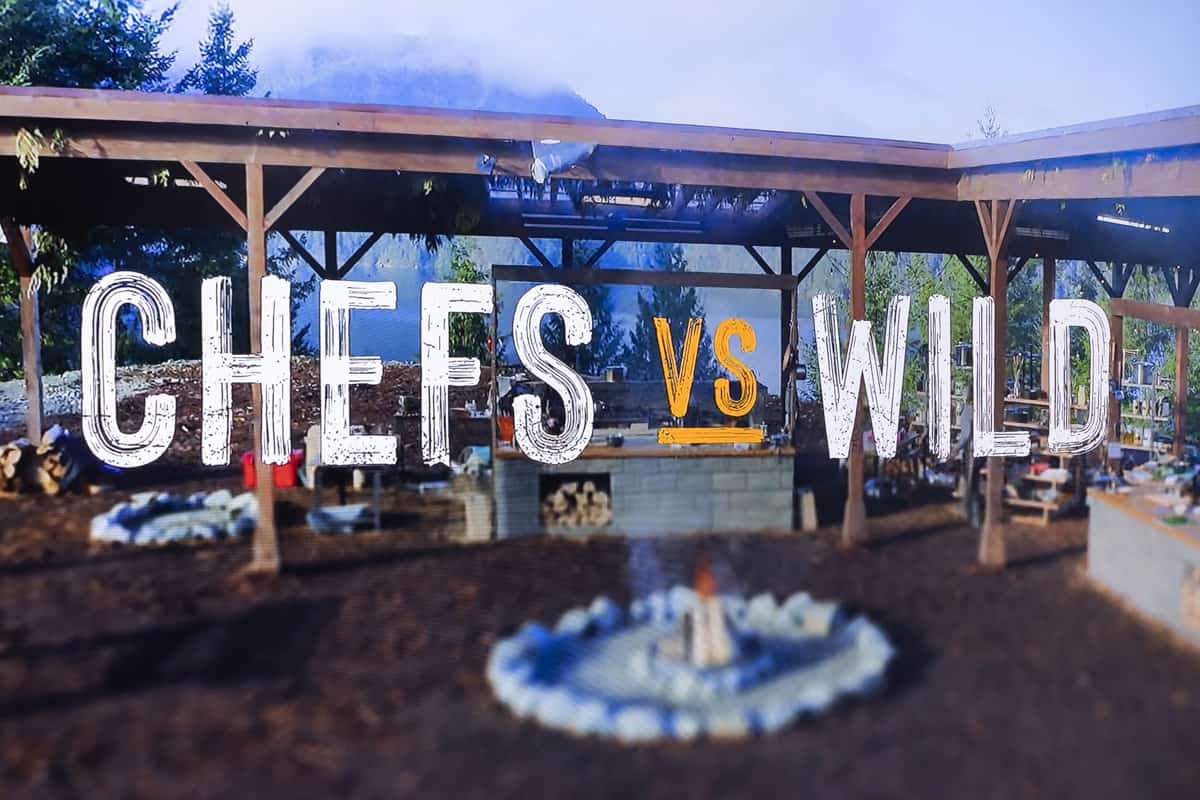
Today I'm going to share my experience on the show, and some of the details you don't see in the episode. Buckle up for one of the craziest rides of my life.
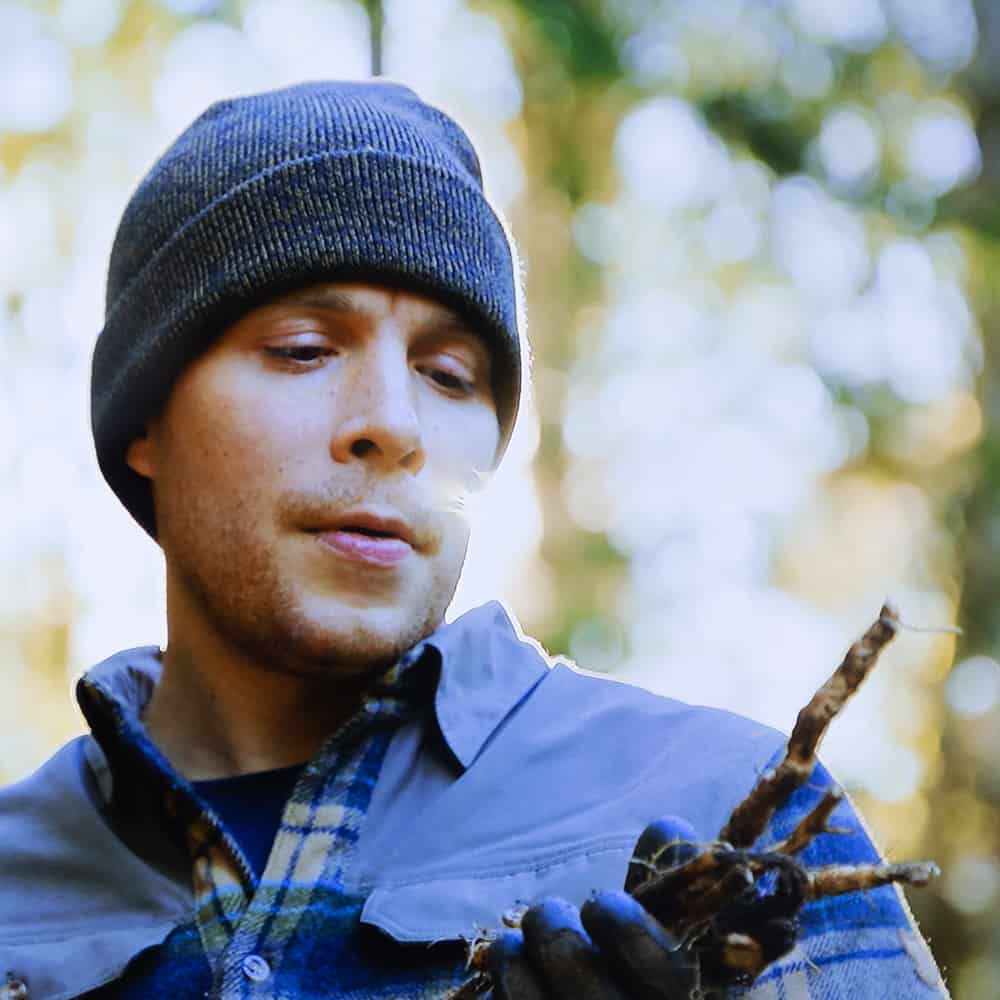
The Casting Process
The casting process for the show was over 6 months long. Like other reality shows, you start out with telephone interviews, then a video interview following a specific protocol a contact guides you through. After that there were what seemed like 1000 emails.
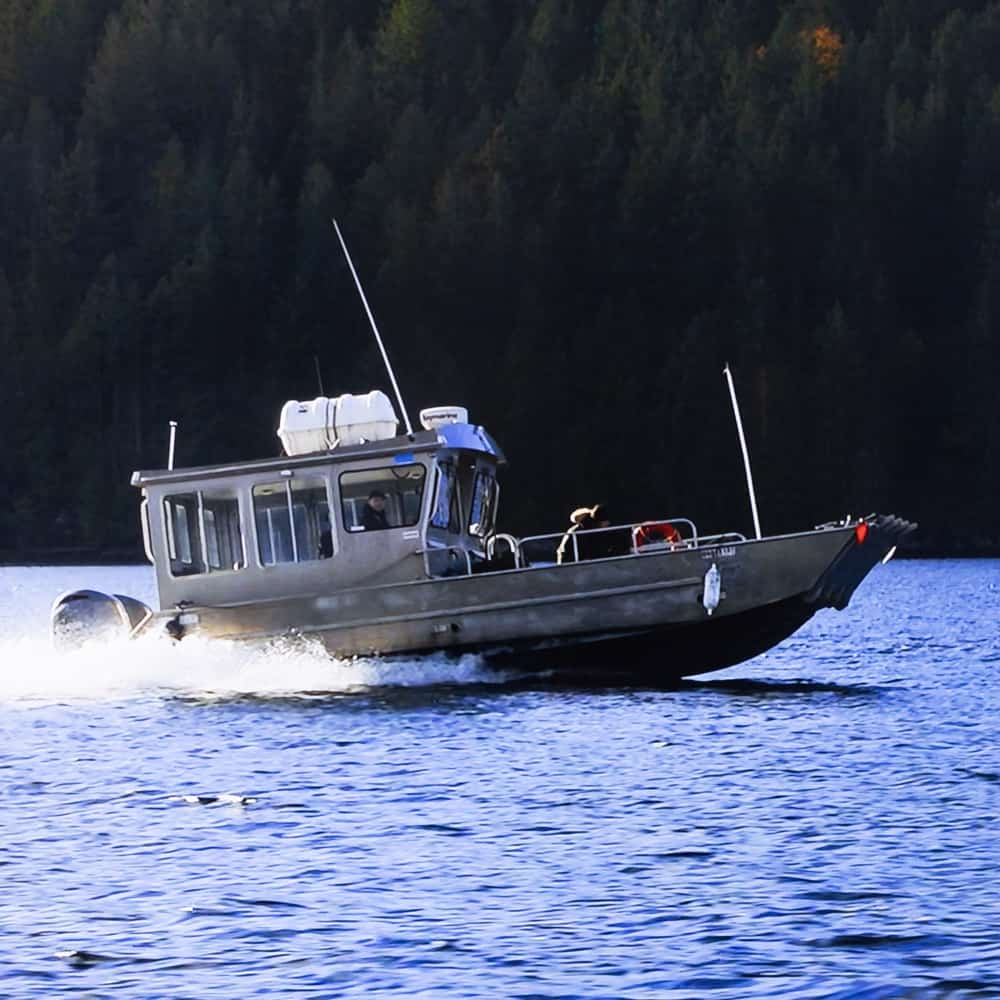
I was kept in the dark about what the show was and where it would air. Having been through more than a few experiences with production companies that pay in "exposure" I didn't pay it any mind until I found out I was cast in early September. Then shit got real.
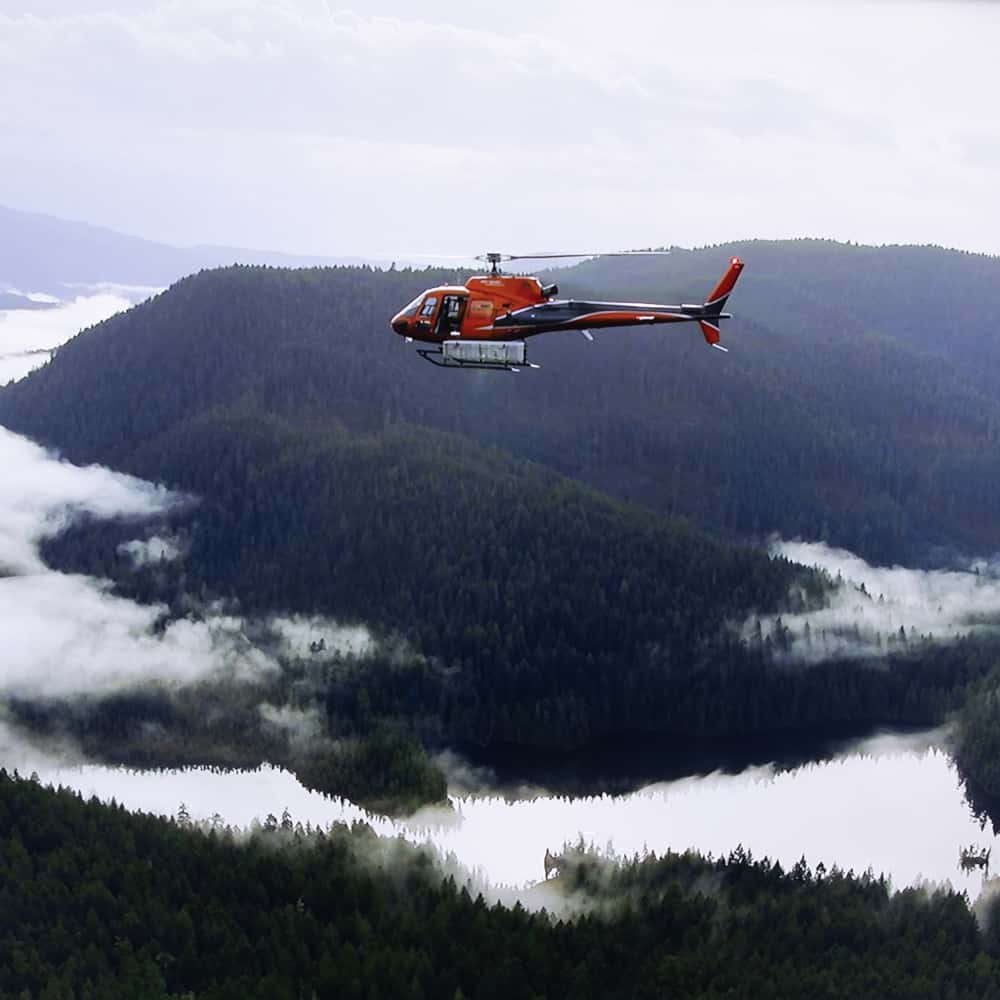
Only when I learned the show was being produced by the same people that did Alone did I start to see the scope of what was coming for me. I watched every episode of Alone filmed in British Colombia before I left to prepare.
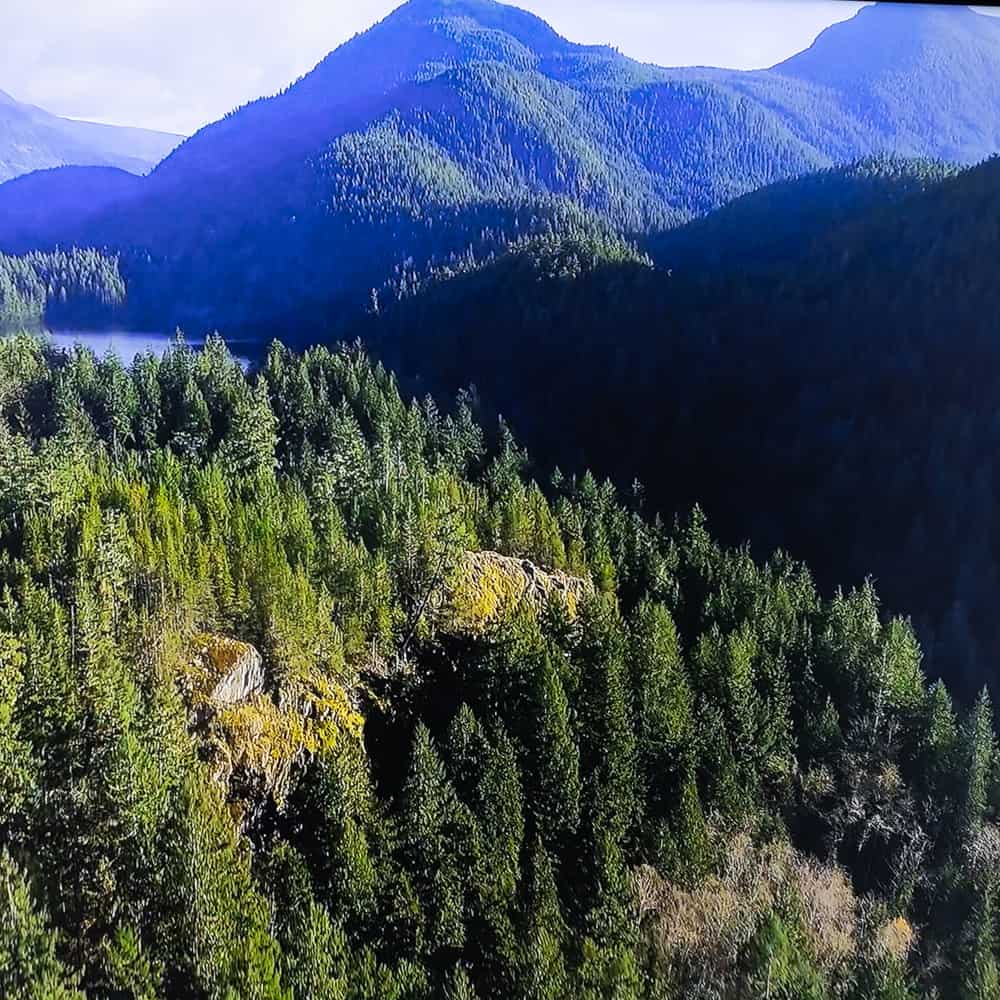
The casting process was intense, involving a human performance evaluation where I had to crawl on the floor like a dog, go up ladders, and do all kinds of inane exercises. I also had to speak to a psychiatrist, presumably to make sure I wouldn't go crazy in the woods.
The "Real" in Reality TV
Make no mistake, the situation shown here is real, although watching the episode it's edited in a way that makes it seem like a walk in the park. There's a ton of legal documents involved in stuff like this, and you basically sign your life away before filming.
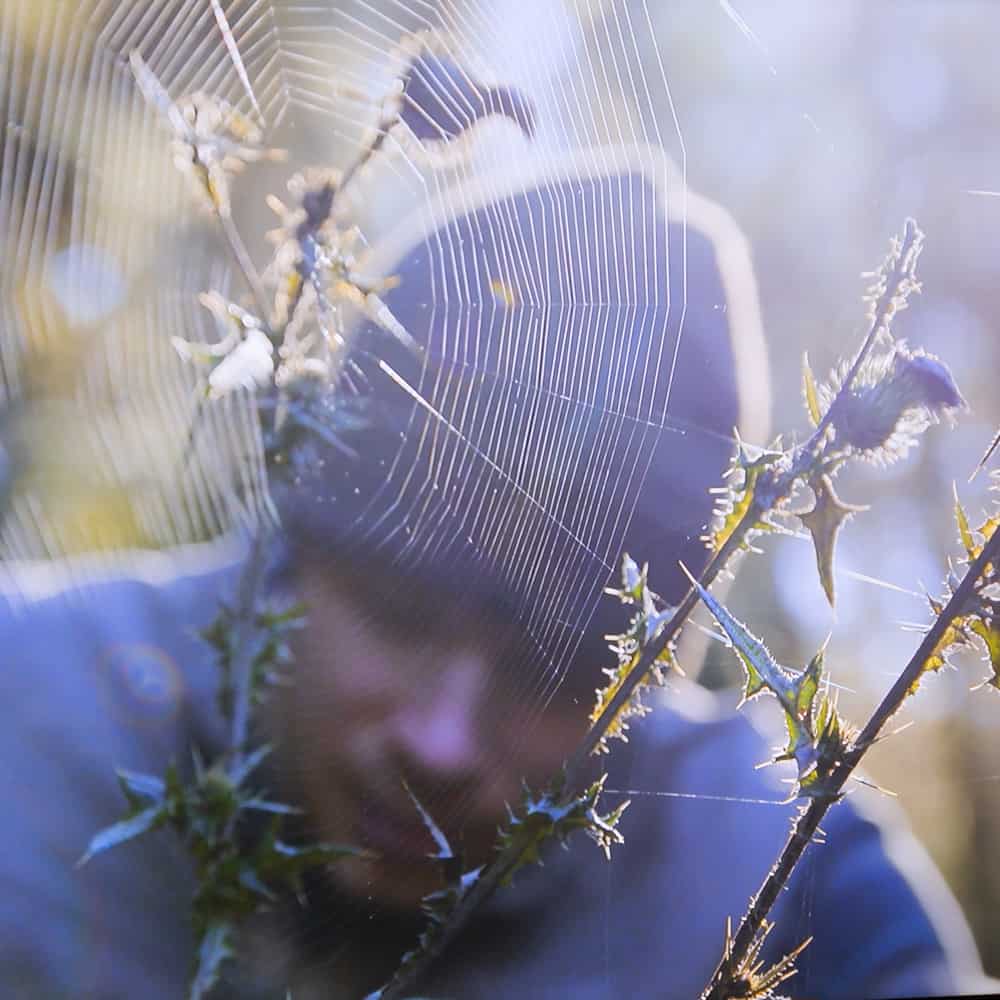
If you get mauled by a grizzly, fall and break your leg, stab yourself, or put an axe in your hand (that happened), the show isn't liable for anything, they just want to make sure whatever happens to you is on camera.
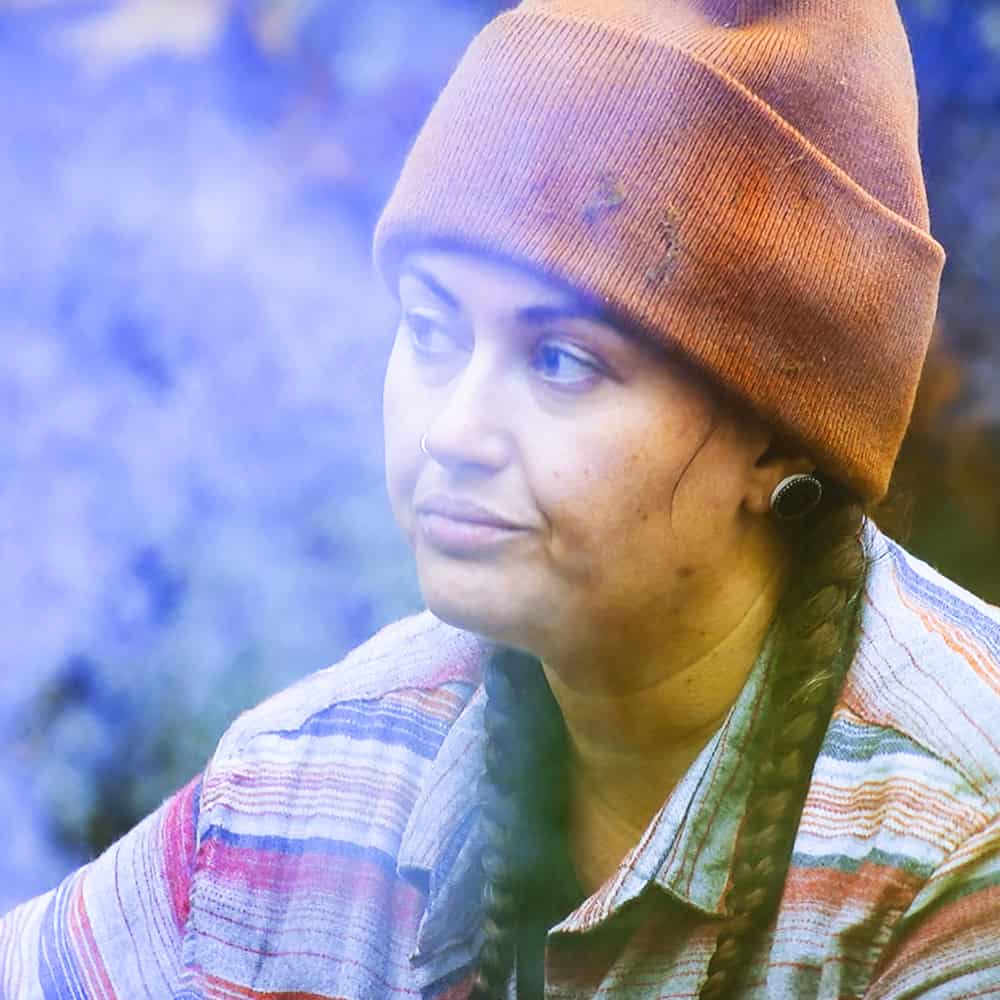
The Jist
Each episode is a head-to-head match between two chefs and two survivalists. Think of it as a sort of wilderness Iron Chef. The goal is to forage ingredients to incorporate into a three course meal at the end, while starving and freezing in the rain for about half a week before the competition.
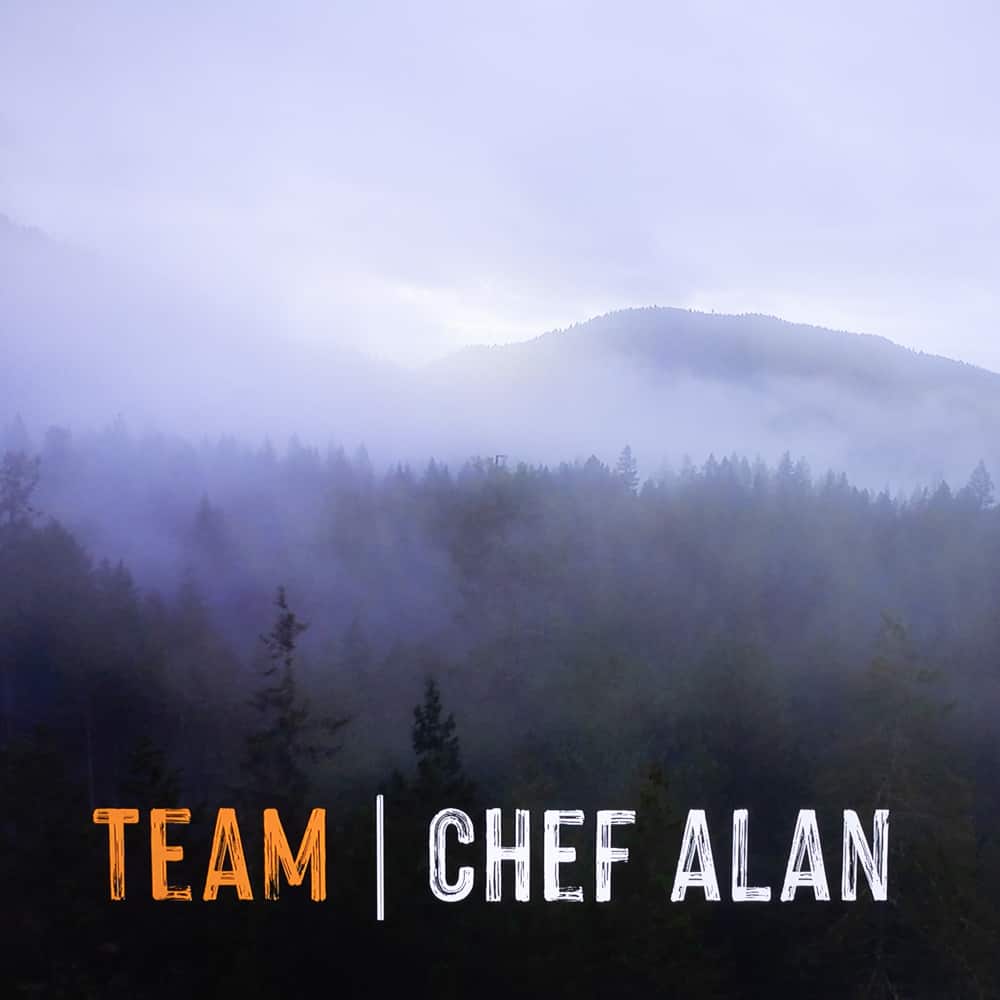
Surviving
After quarantining for five days in a hotel where someone brings you ice cold food three times a day, I was introduced to my partner Baha, an survivalist from Kirgizstan with Russian Military experience who lives in Ontario. His accent was reminded me of Borat, if every sentence ended in "Eh".
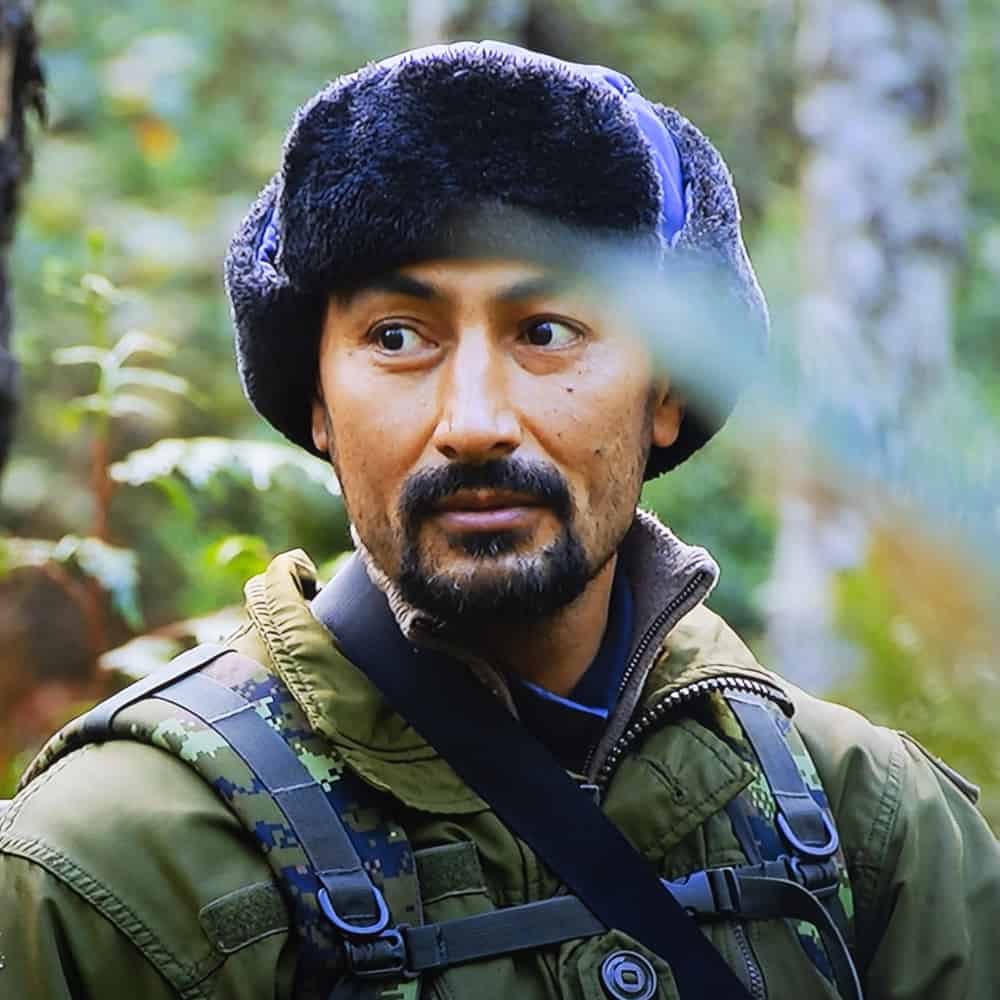
I also met my opponent, Chef Nico Albert, A Cherokee chef from Oklahoma who was a total sweetheart and super talented. Her partner Greg was a survivalist familiar with wild edibles experience from Alaska.
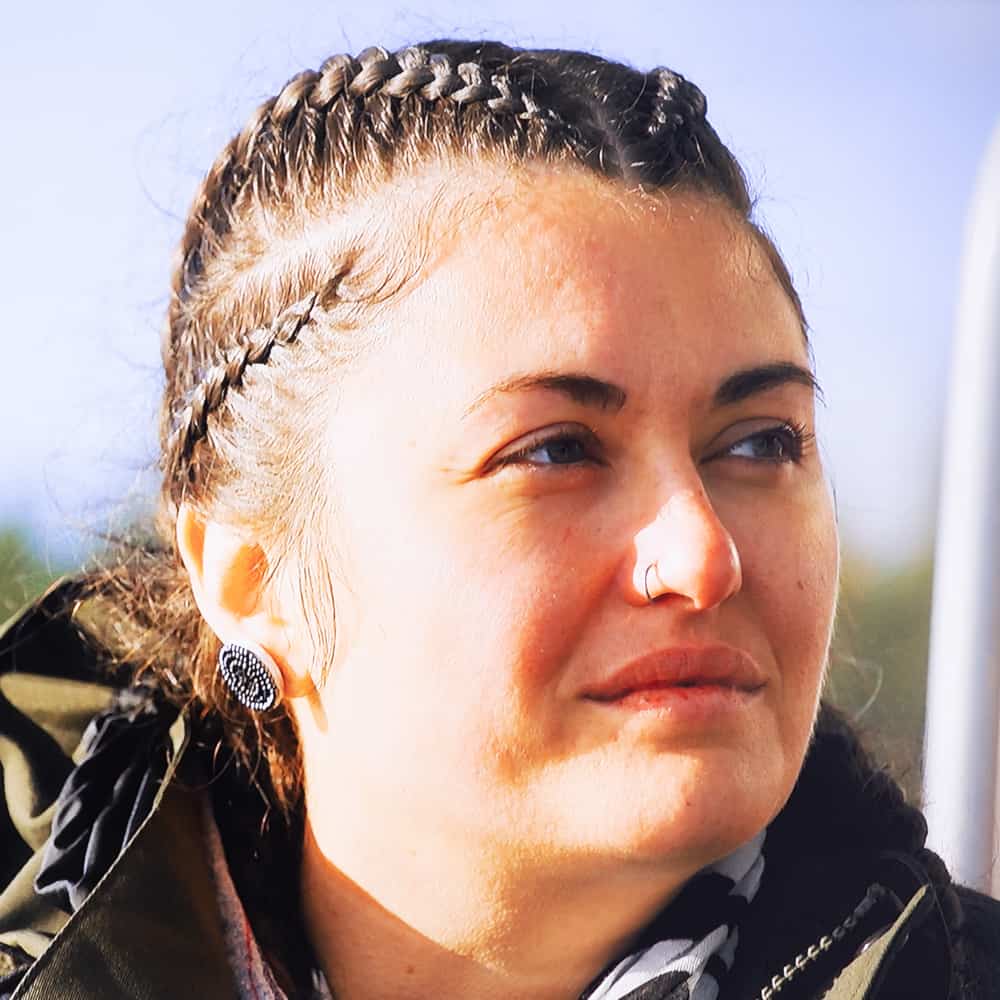
We were put on a boat and brought to Hardy Island, an island with plenty of wilderness as well as an ice cream shop and marijuana farm. We were not allowed to sample either of the local delicacies.
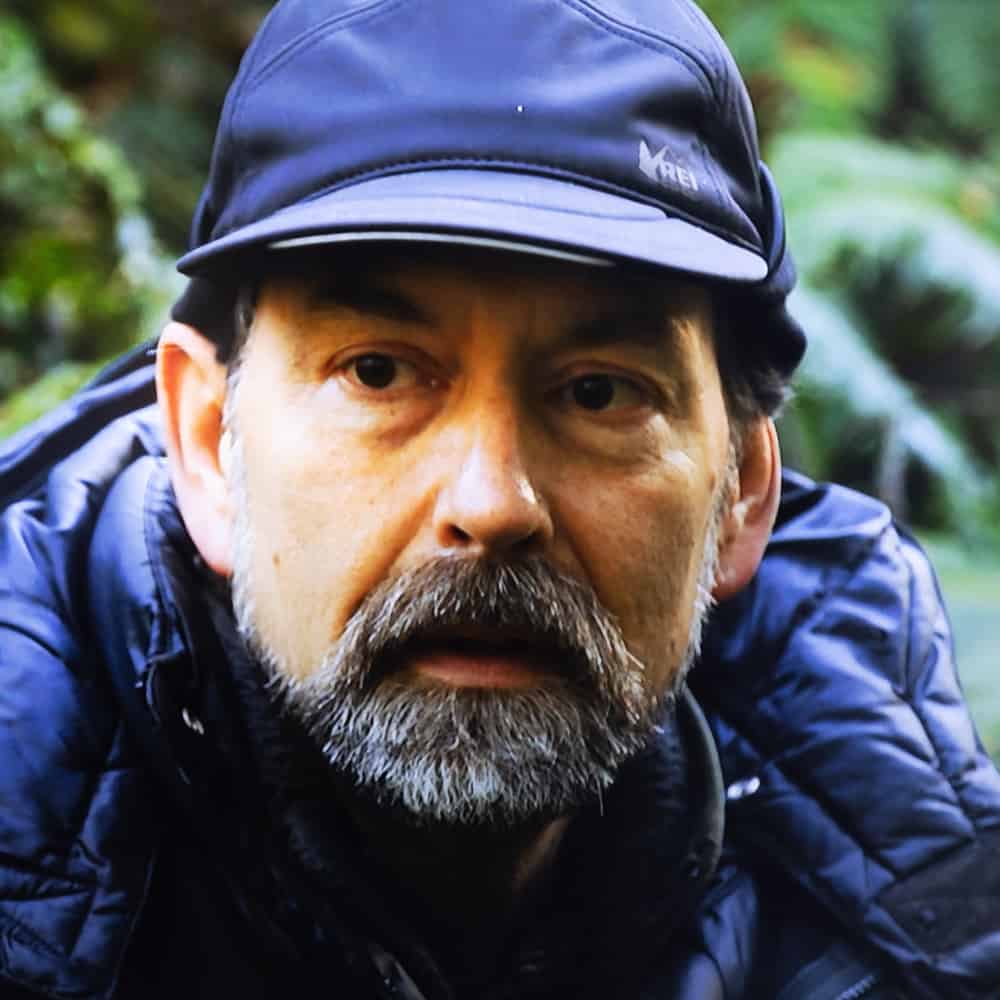
The first day we were shown an area we could set up shelter and did a little poking around. The first thing I noticed was piles and piles of bear scat on the shore next to the evergreen huckleberries, which seemed to be everywhere.
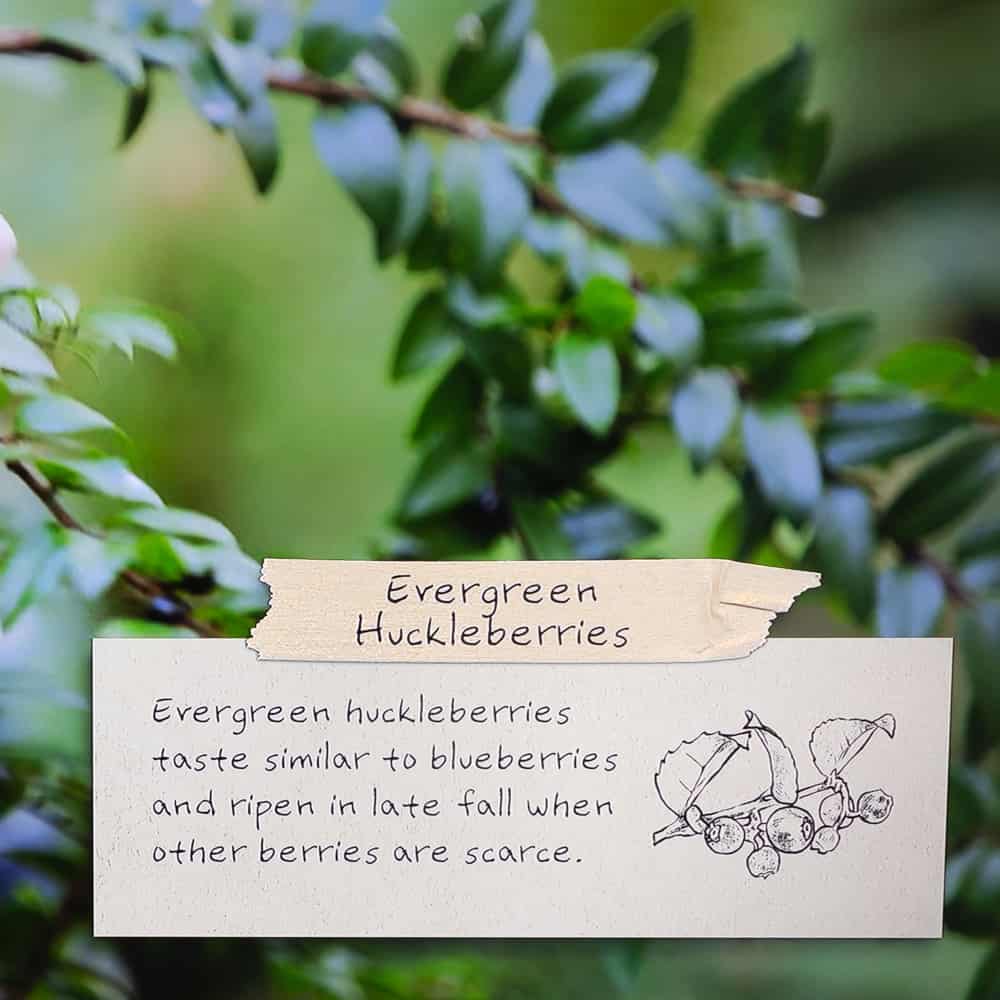
My partner and I set up the shelter, first laying down a layer of fern leaves about 4 feet tall for our bed. Then we tied a tarp between a few trees, and basically called it a day. Starting fire in a temperate rainforest was a crucible, and the production team had to give us some training wheels the first night (a firestarter). Afterward, we kept moss in our pockets to dry and help start fires.
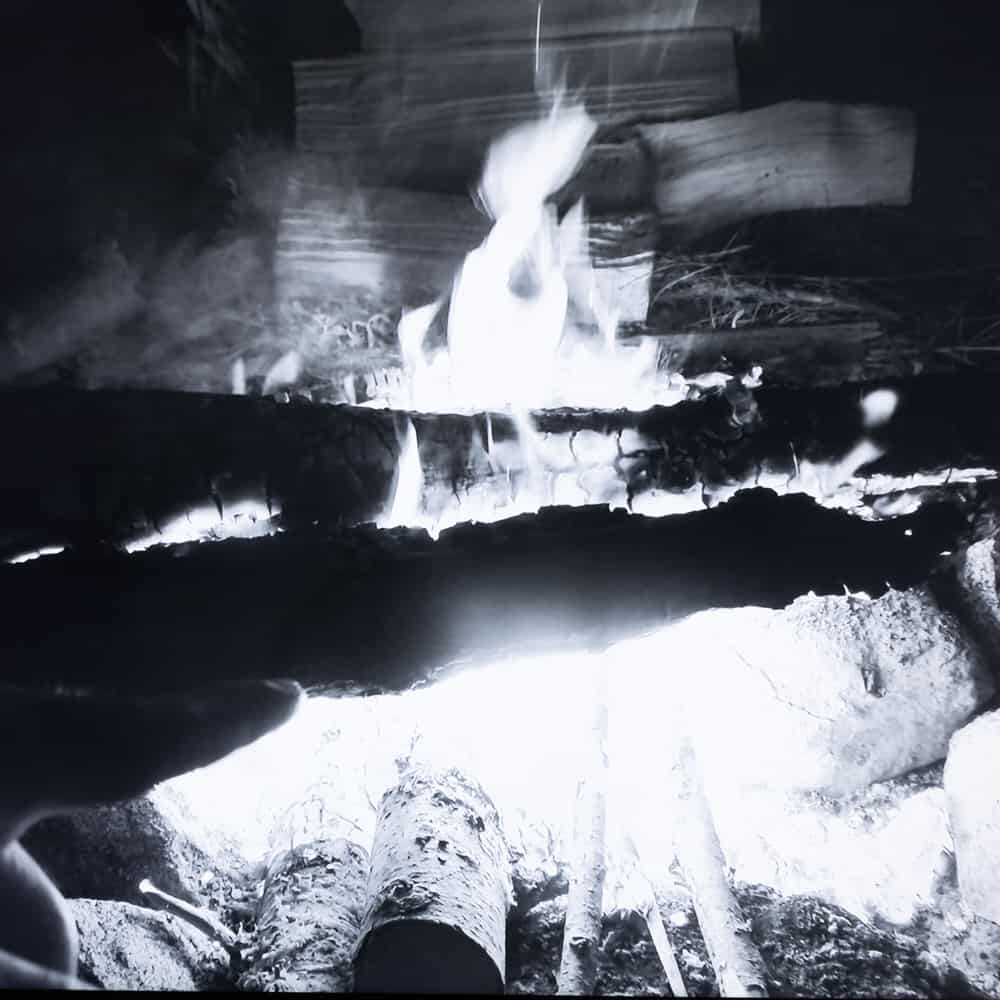
It was cold, so cold that the puddles were frozen in the morning, so we tried to keep the fire going all day. That was a mistake. We spent more time sawing logs the first 3 days than we did foraging.
Every morning a film crew with two cameras (fully equipped each camera is over $100k each) showed up to document our process. After dark, we were left to our own devices and expected to document more of our experience with two trail cams, two go-pros, and a hand-camcorder around our camp.
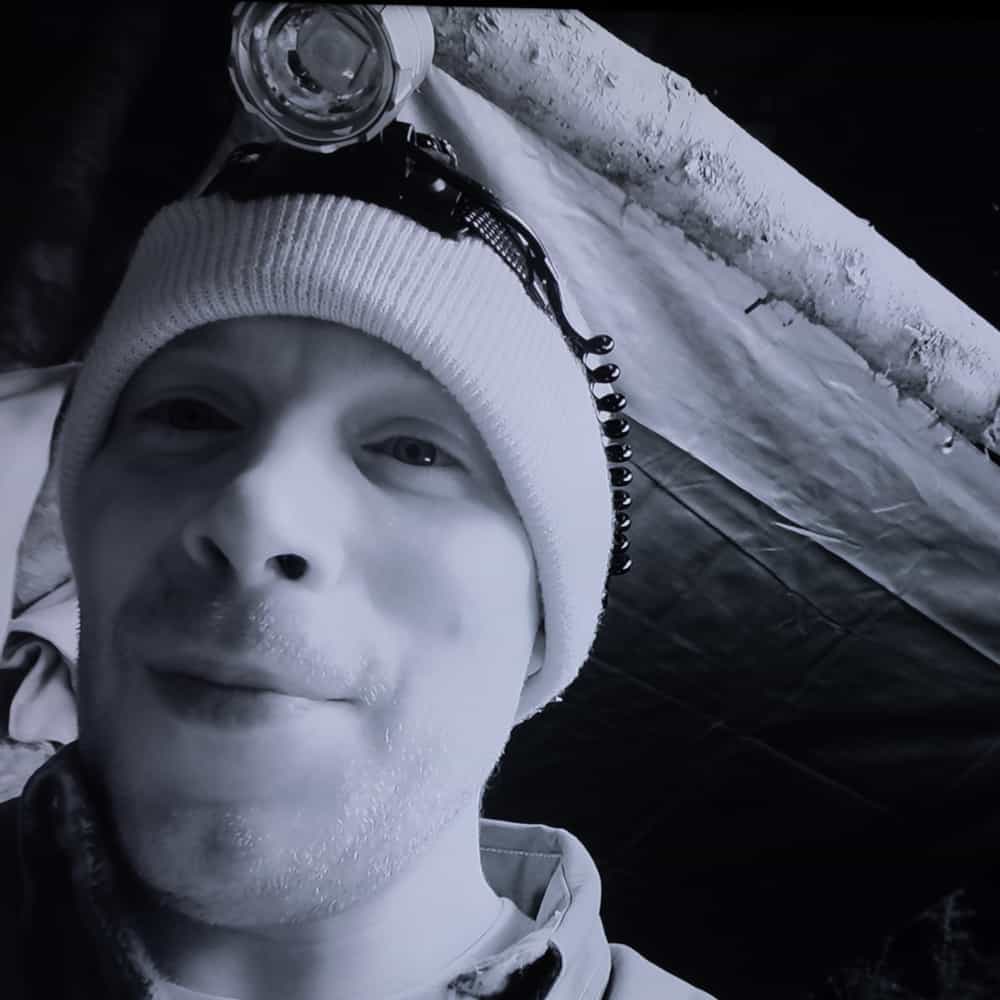
Darkness comes early in the woods, and we would lose light by about four pm. After the camera crews left, we would cut as much wood as we could, putting long, wet alder logs into the fire. Soft woods don't make coals, so to keep the fire going we had to sleep in about one hour shifts, Baha or I making sure the fire didn't go out while the other "slept".
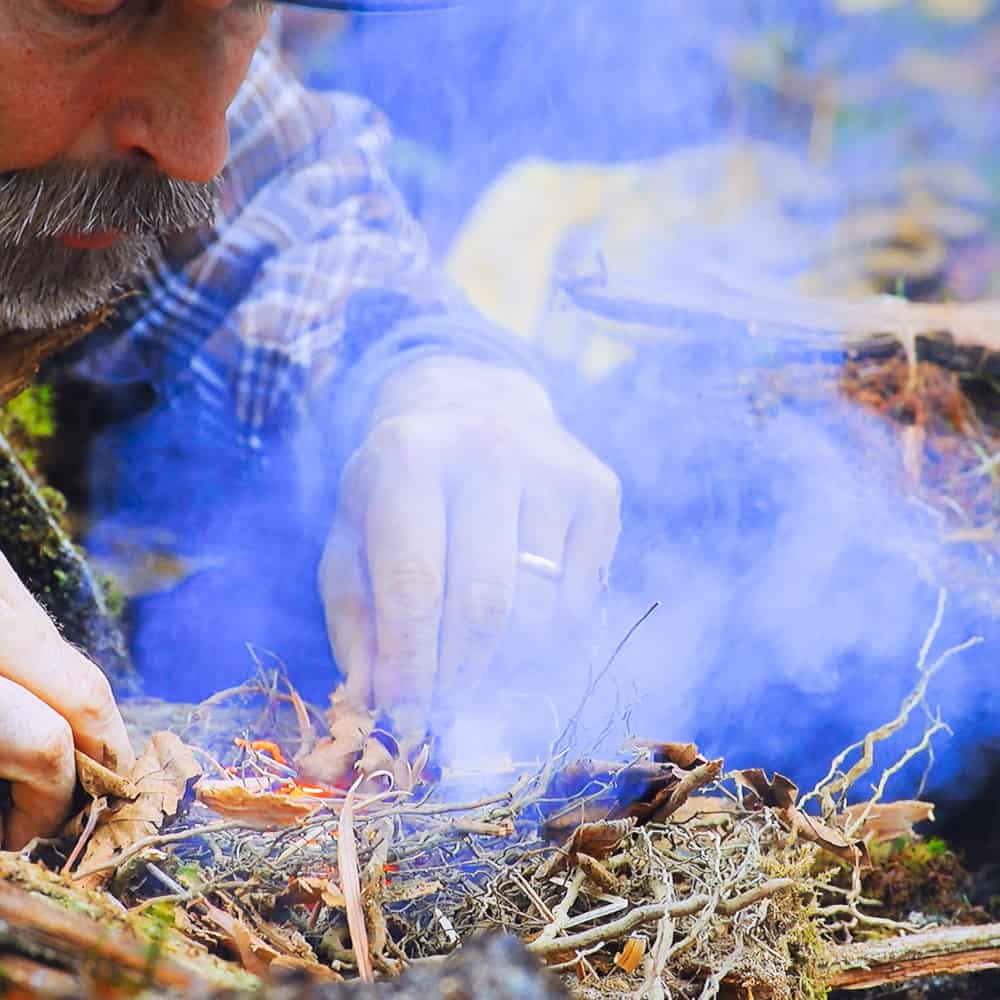
It was eerie sleeping in an open setting that could invite wildlife. Besides a squirrel here and there, the most notable was branches crashing one night in the dark, followed by foot steps in a perfect circle around our camp. Just by hearing the steps, I could tell it was feline, which meant a mountain lion.
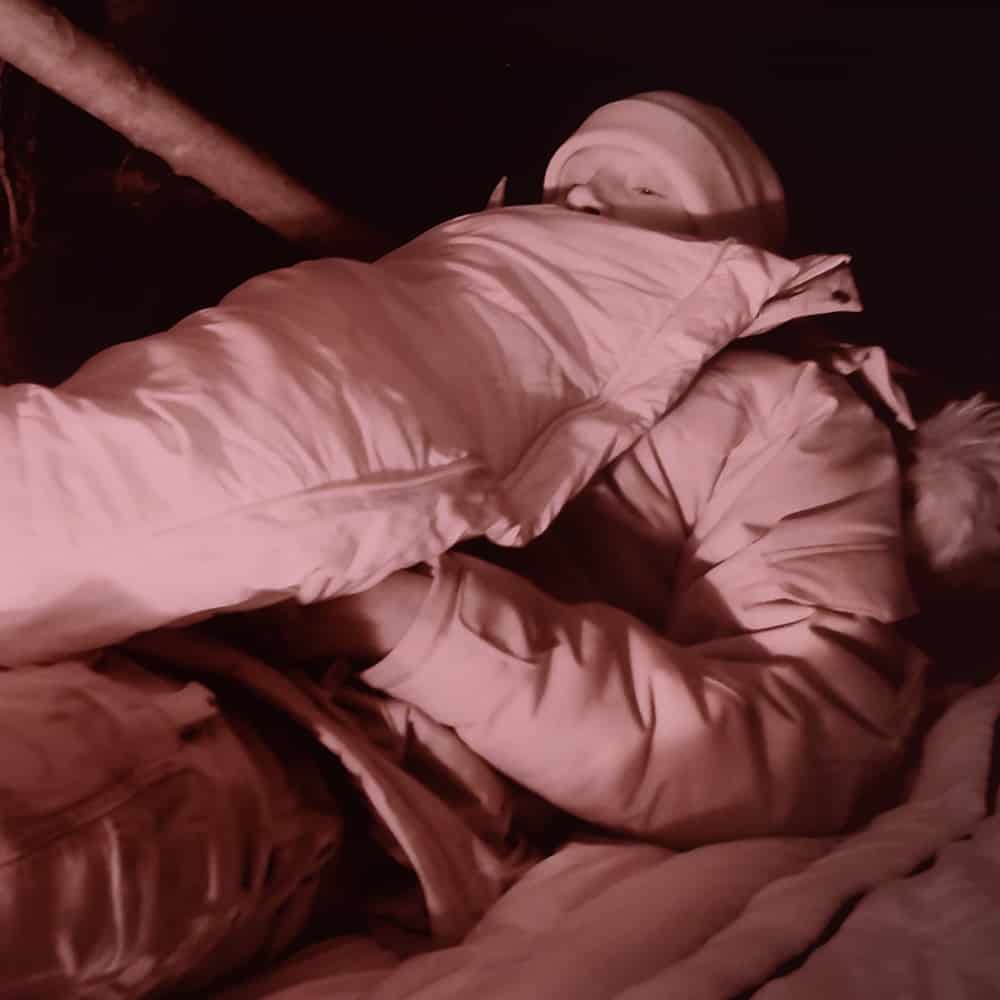
Hearts pounding, Baha and I turned the camera on to document our impending death per our contract, threw all the wood on the fire we could and quickly carved sharp sticks. The safety team caught the mountain lion on camera the same night at their camp, but, unfortunately, that part was cut from the episode. The part where our shelter catches fire they left in.
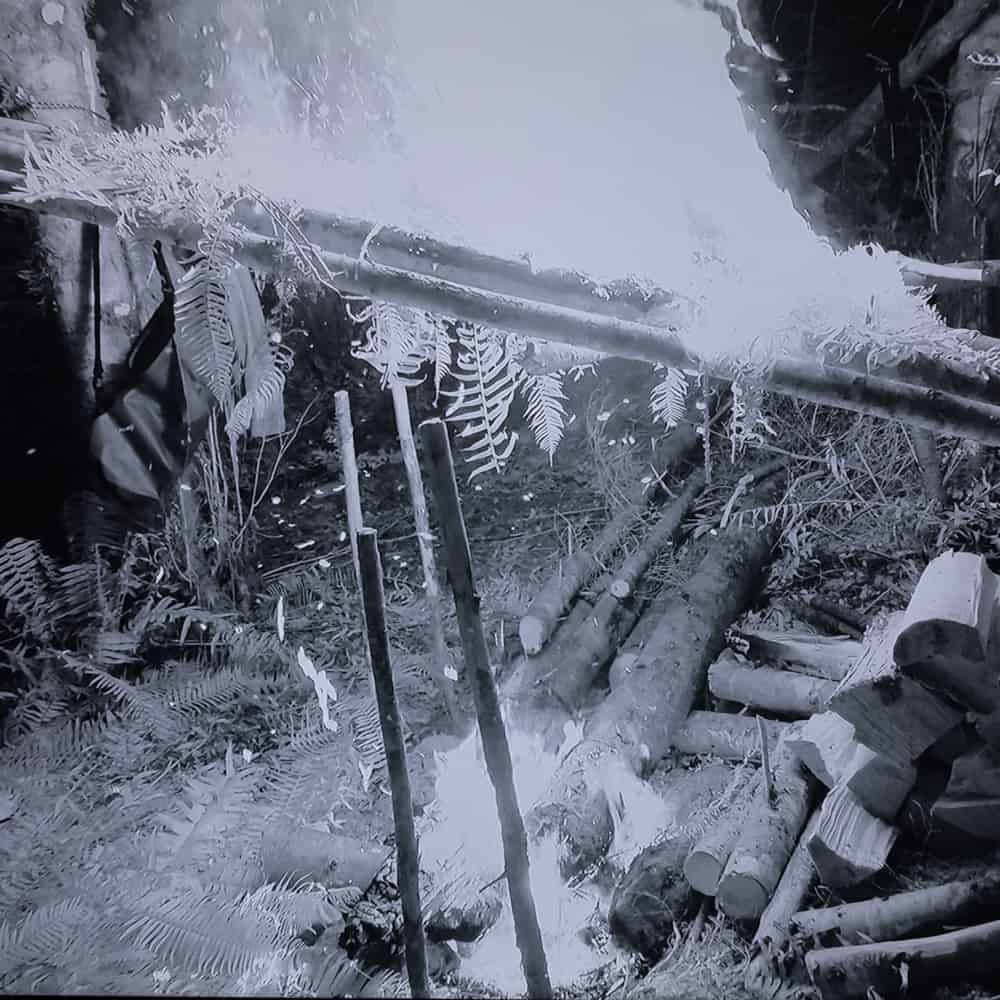
Food was scarce. Water had to be boiled and was a 30 minute walk from camp. Thankfully we had a beach filled with more oysters than I've ever seen, with shells as big as hamburger buns. I was thrilled, Baha, who had never eaten a raw oyster wasn't as excited.
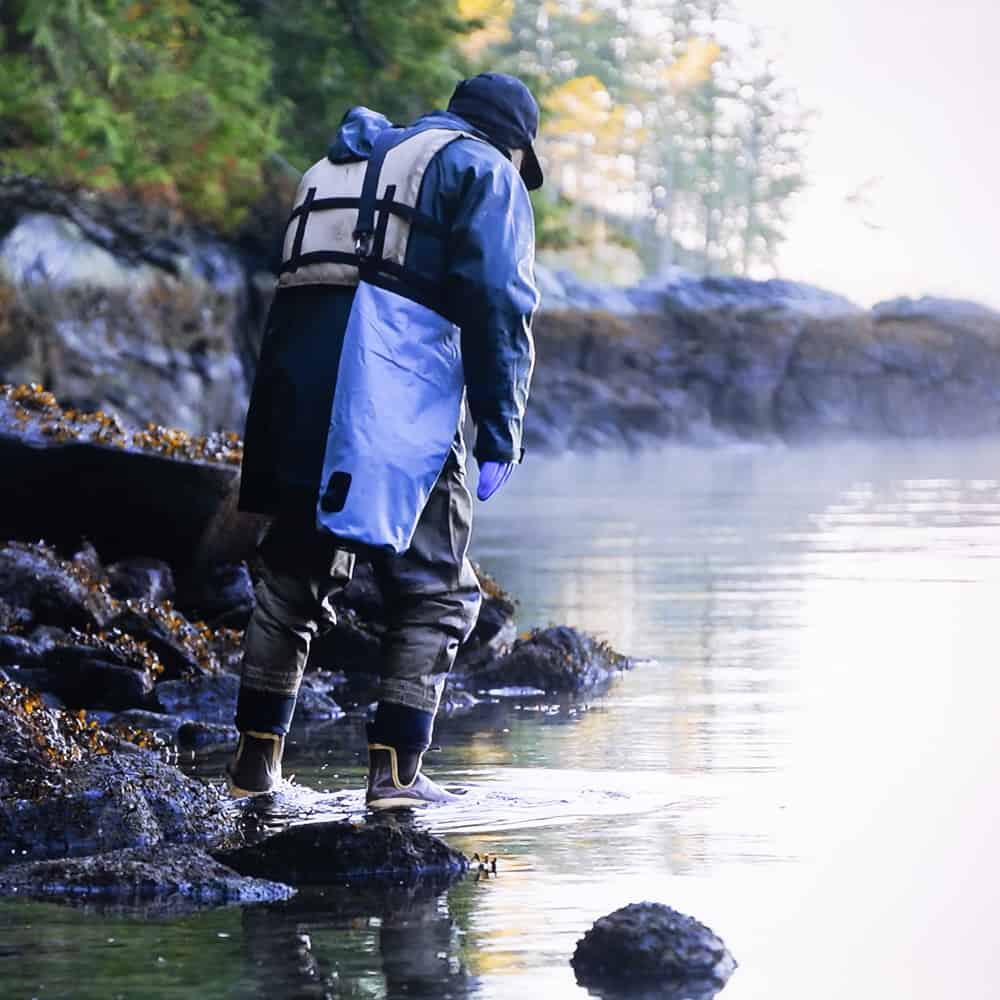
Each morning I requested to be escorted to the beach for "breakfast" where I would shuck and eat raw oysters until I was completely filled. I wasn't going to starve, but oysters are pure protein. The resulting constipation was so bad I thought I would perish.
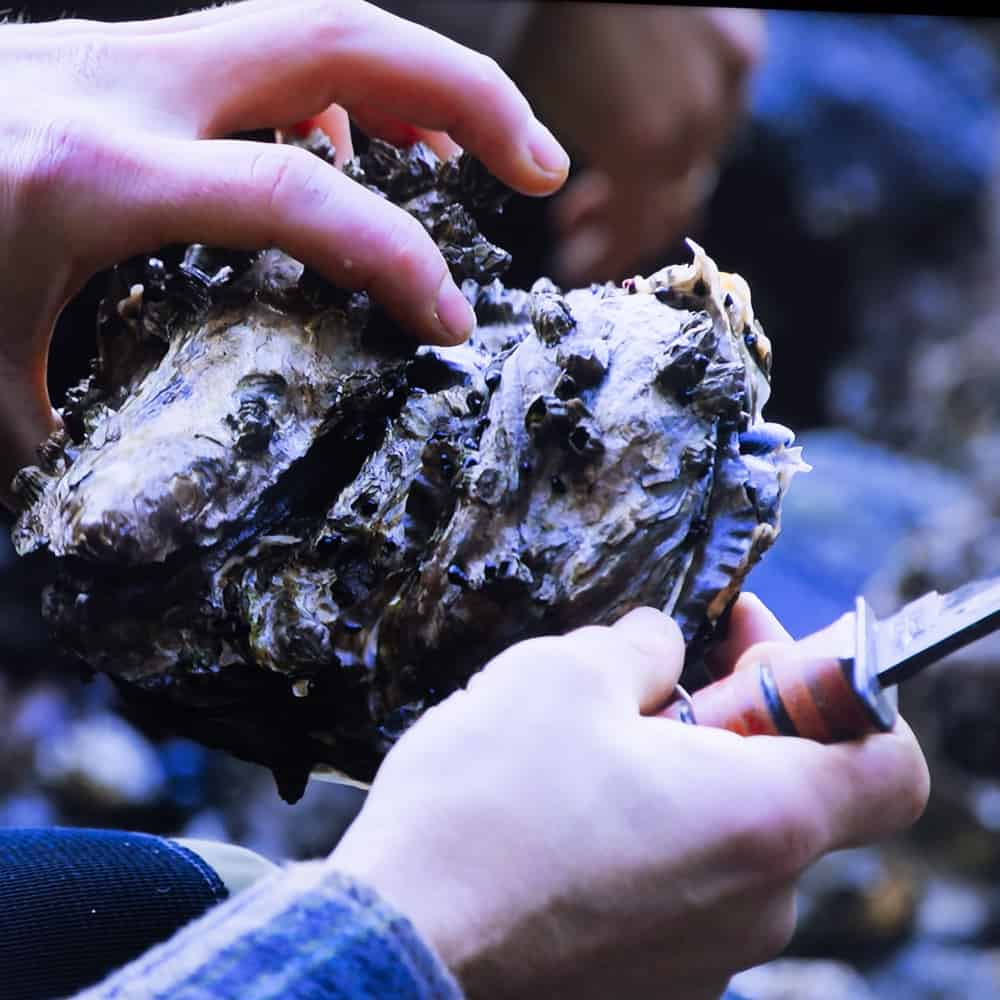
The other menu option we had was bladderwrack, a ho-hum seaweed. It didn't agree with Baha and the crew filmed him vomiting on camera, although it isn't in the final edit.
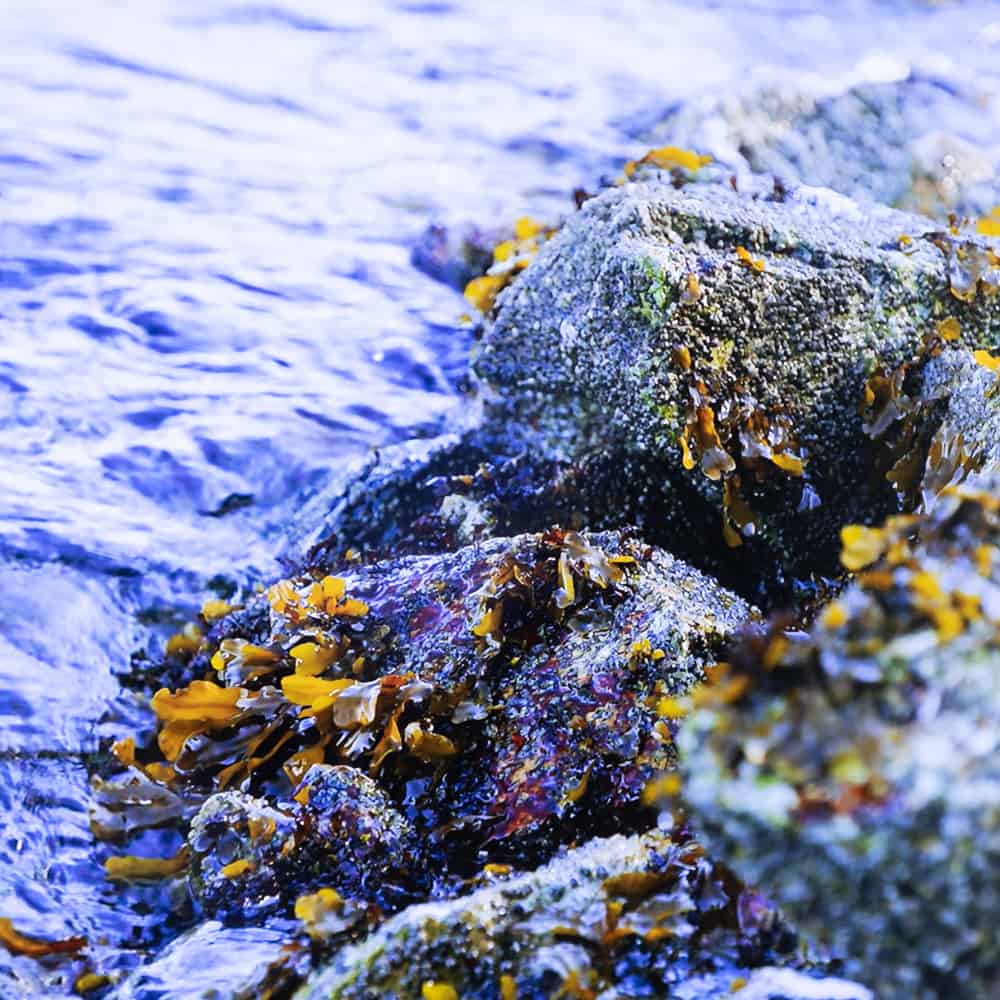
Foraging
The whole foraging aspect of the show made me uneasy. I knew the production company likely had survivalist consultants with experience from Alone, but people knowing next to nothing about foraging trying to make content about wild food happens more often than you'd expect. For example, in Episode 4 a survivalist has his chef partner try raw skunk cabbage-don't try that at home kids!
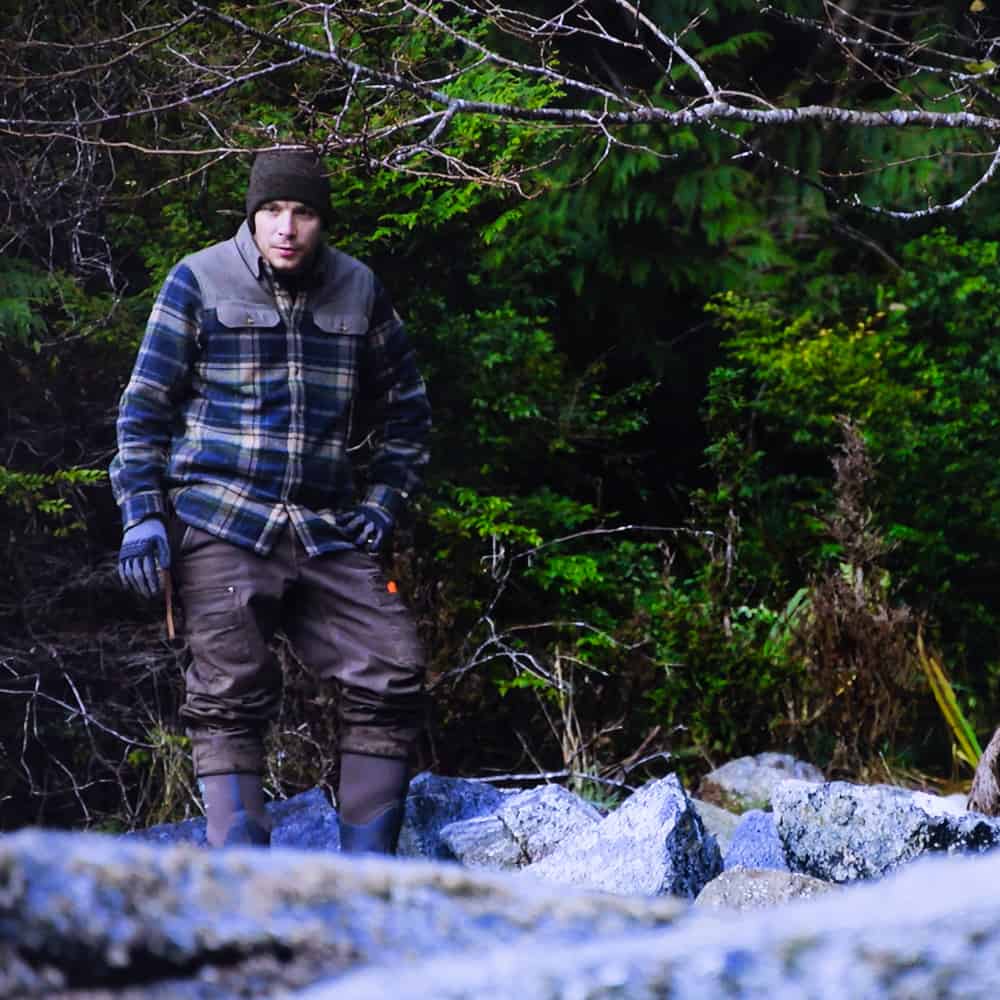
Before we left for the camping trip, we were introduced to a botanist who showed us a few edible plants. This was helpful, but some of the ingredients like licorice fern have a steep learning curve. Only having a 4 quart pot in the woods for boiling water made testing dishes nearly impossible.
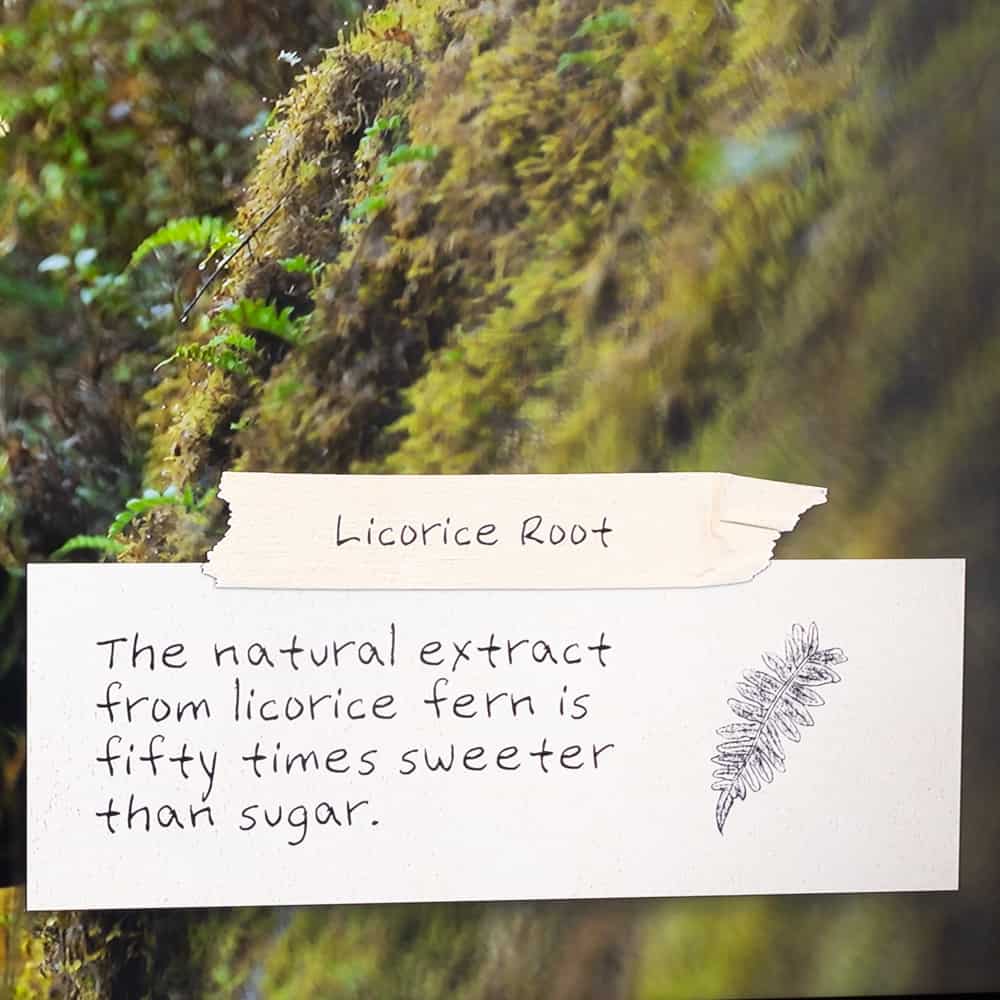
Finding the disturbance
Walking around the old-growth coniferous forest was a difficult. Everything was covered in moss and your feet sink into everything like compost. The forest floor was a sea of waist-high ferns as far as the eye can see, without a single edible plant or mushroom in sight.
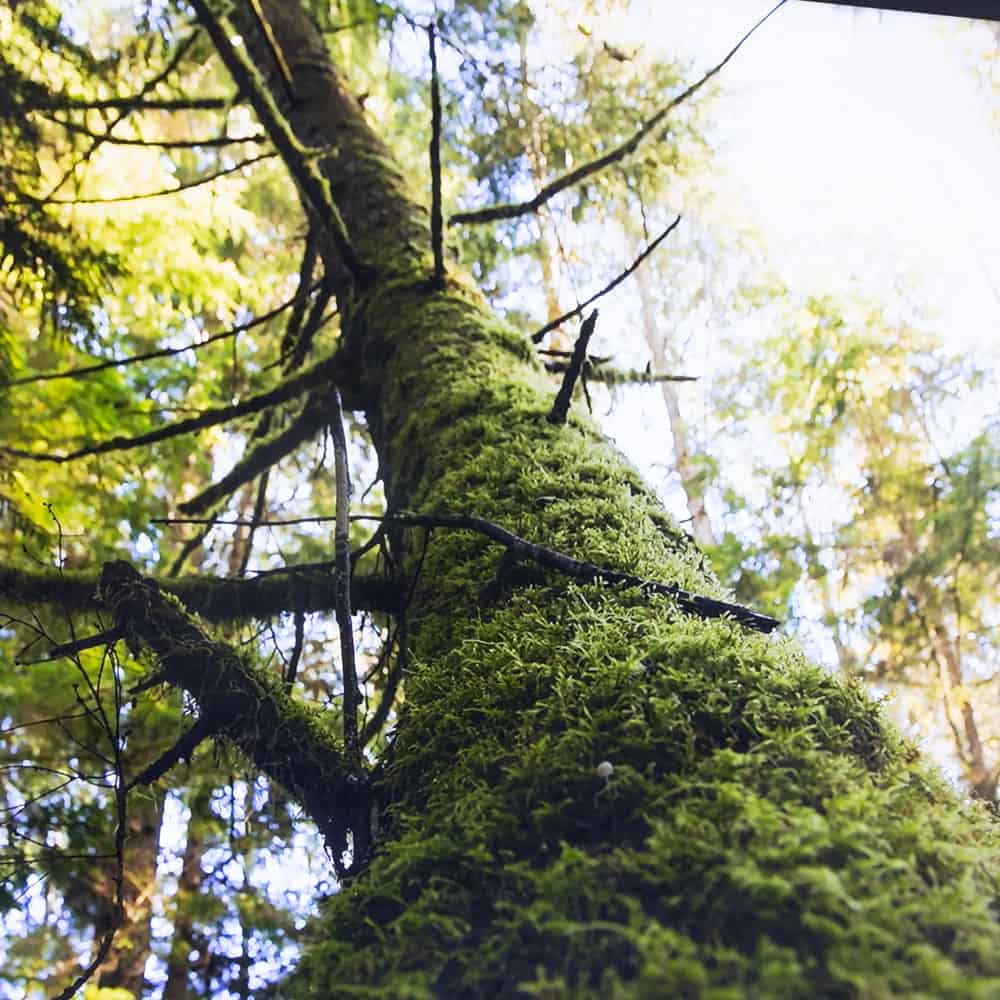
Tapping into the what I've gleaned from Sam Thayer over the years, I knew that if I was going to find any green edible plants, I was going to have to find a boundary, or an area humans have disturbed.
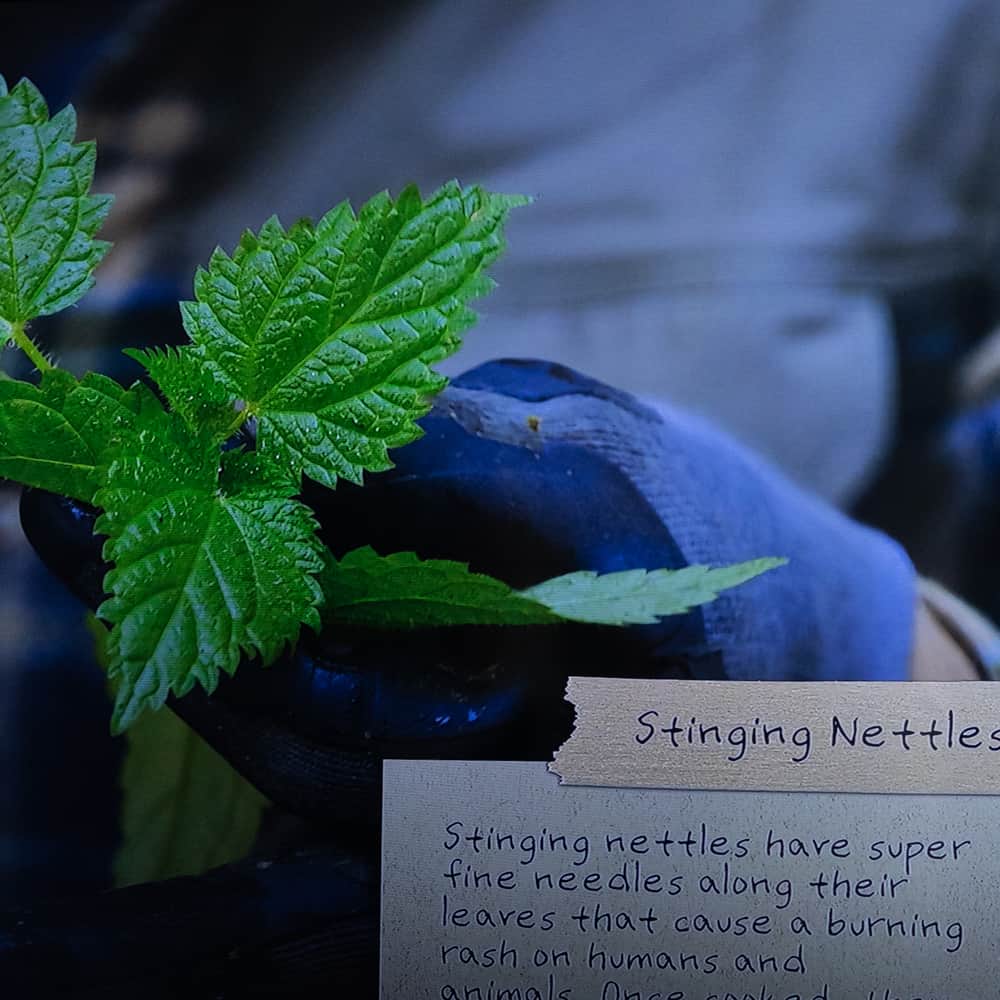
Luckily, one night after the production team left, I ventured out to a clearing I could barely see from camp. It was a construction dump filled with industrial equipment like tires, broken glass, and discarded pallets. I was in heaven. Around the edges of the trash dump I found nettles, and arguably my biggest find: thistle roots. I didn't know the species, but once I unearthed a few roots I suspected they could make a good vegetable.
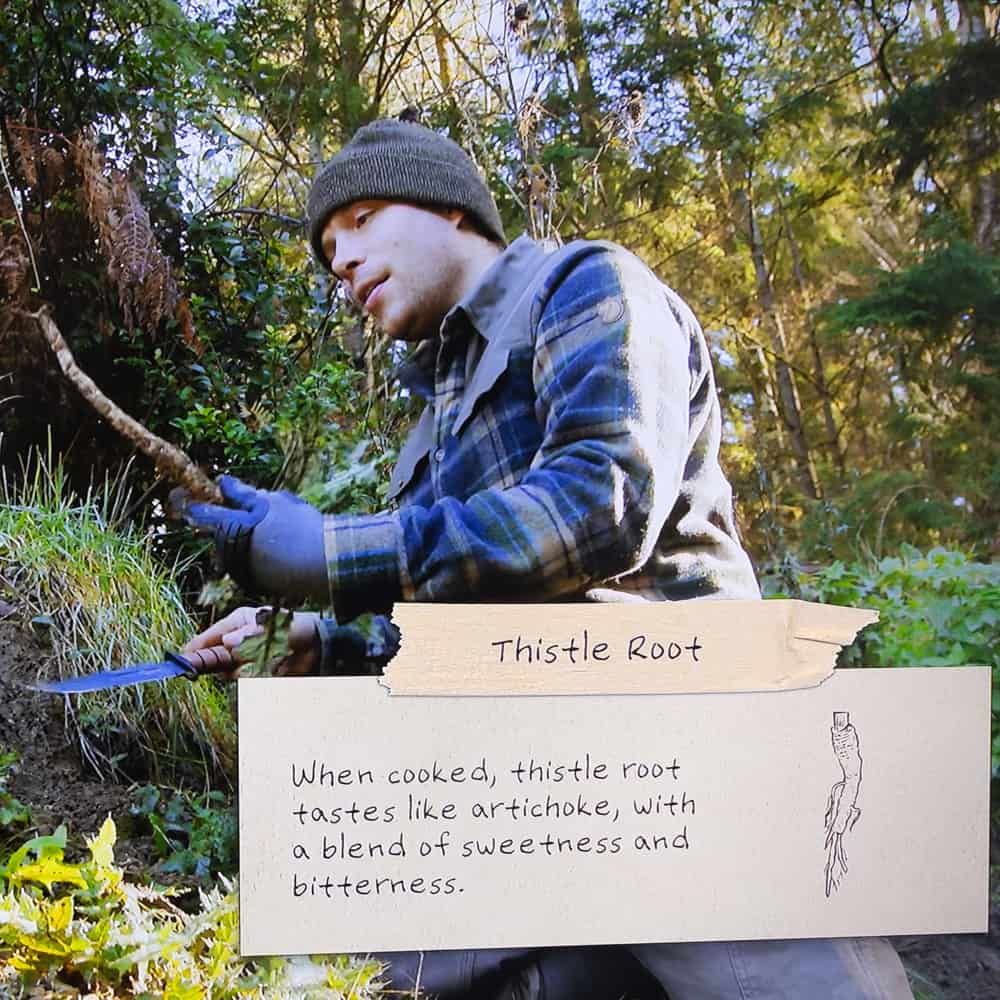
I brought the roots back to camp, then boiled them to make sure they would become tender. Not wanting to waste our precious drinking water, I drank the cooking liquid. Thistle root cooking liquid is apparently a strong diuretic, and for the next 6 hours through the entire night, I remember having to pee about every 15 minutes.
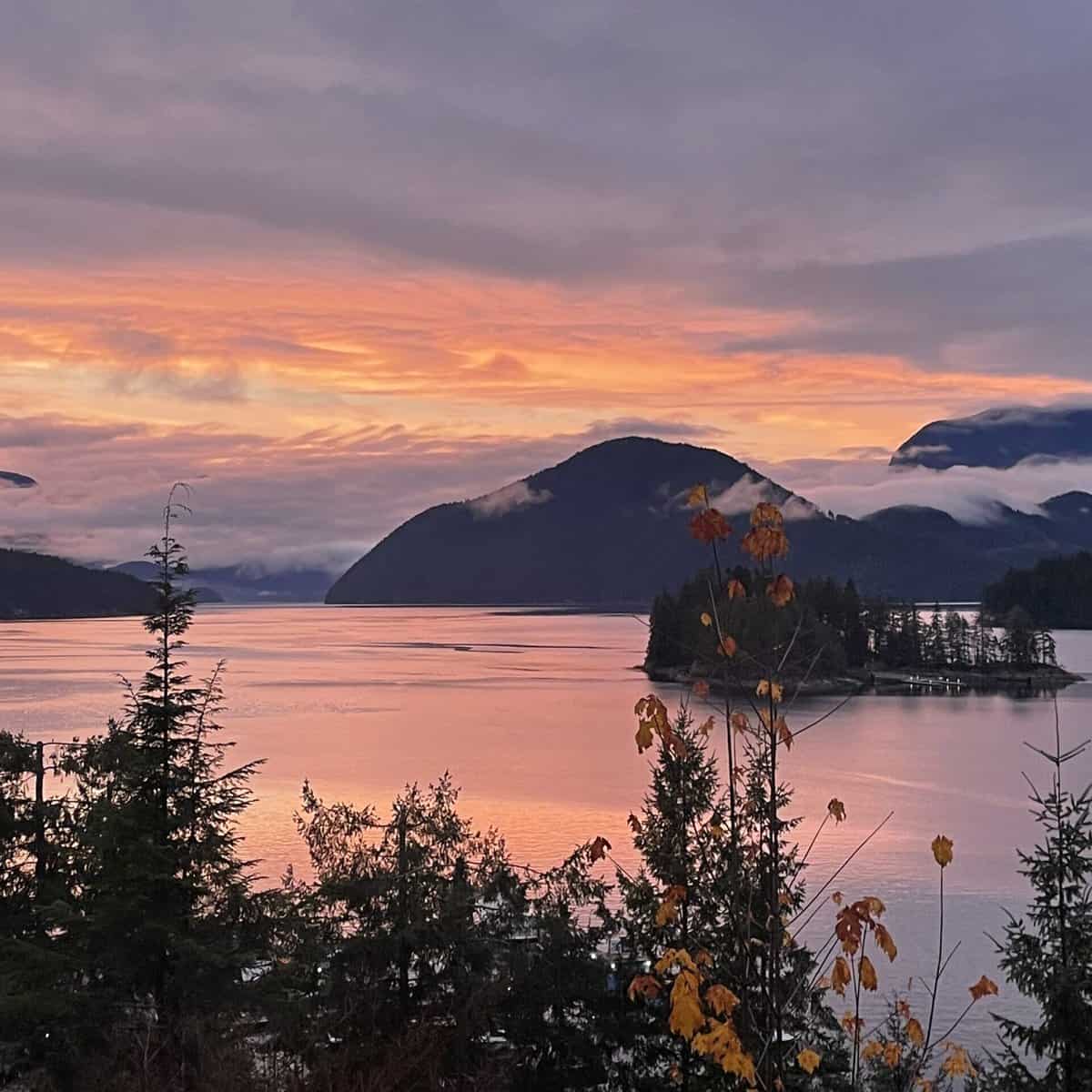
Shore crabs
After watching every episode of Alone filmed in B.C. I knew a few things I could expect to see. One of them was small crabs on the shore hiding under rocks. For years I've prized crustacean shells for their flavor, and I knew that no one else would probably think to use them as there really isn't any meat on them.
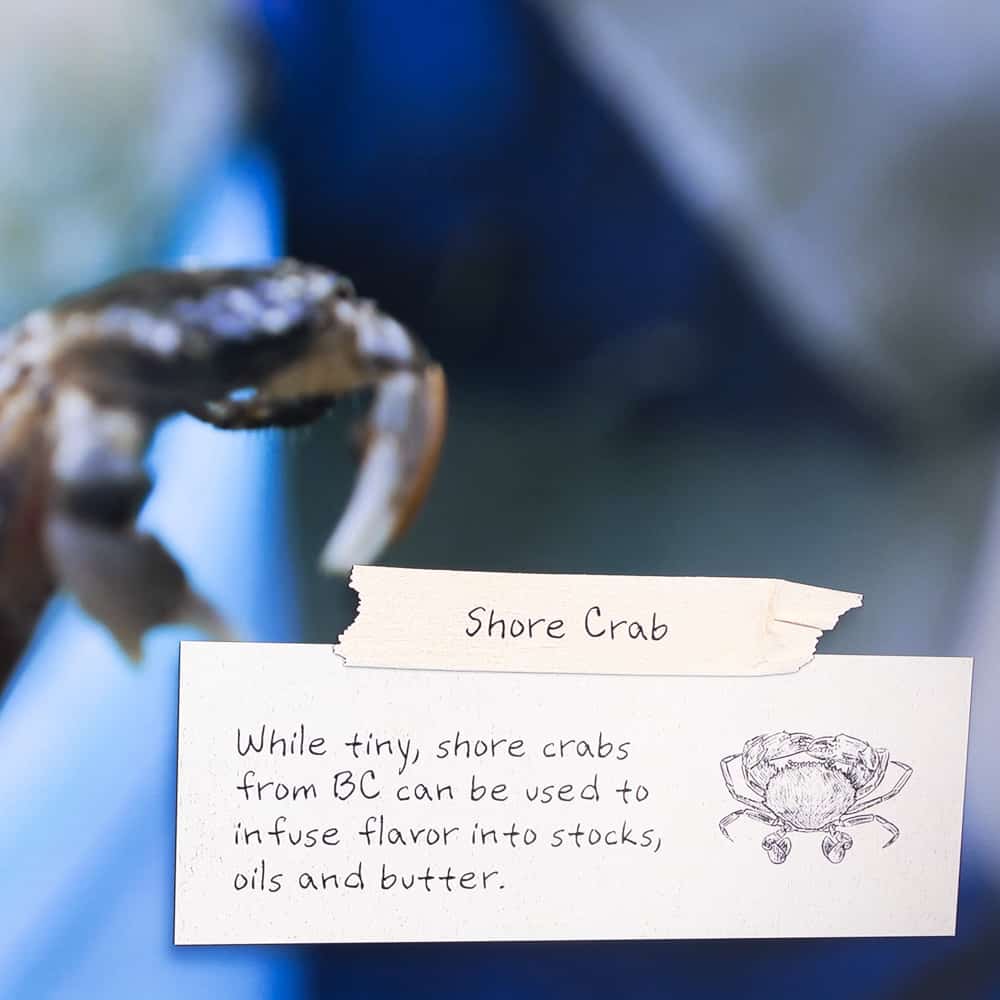
There's a ton of flavor in the shells, so I harvested a bunch, pounded them to a paste and simmered them in butter to make crab-flavored hollandaise. The flavor of the hollandaise is fantastic, but apparently the editors needed a something to ding me on so you won't get that impression from watching the show.
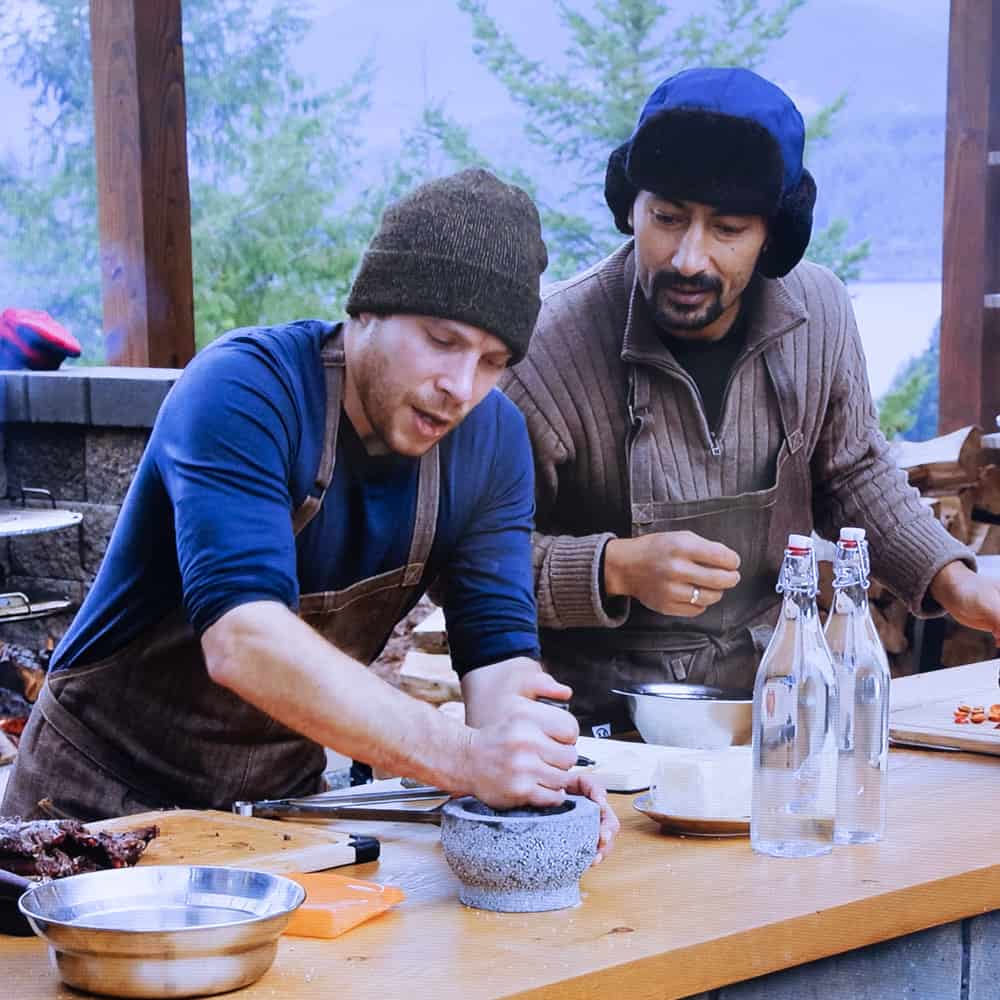
When it came time to judge the dish, the host Kiran said "The flavor of the crab isn't coming through" or something like that.
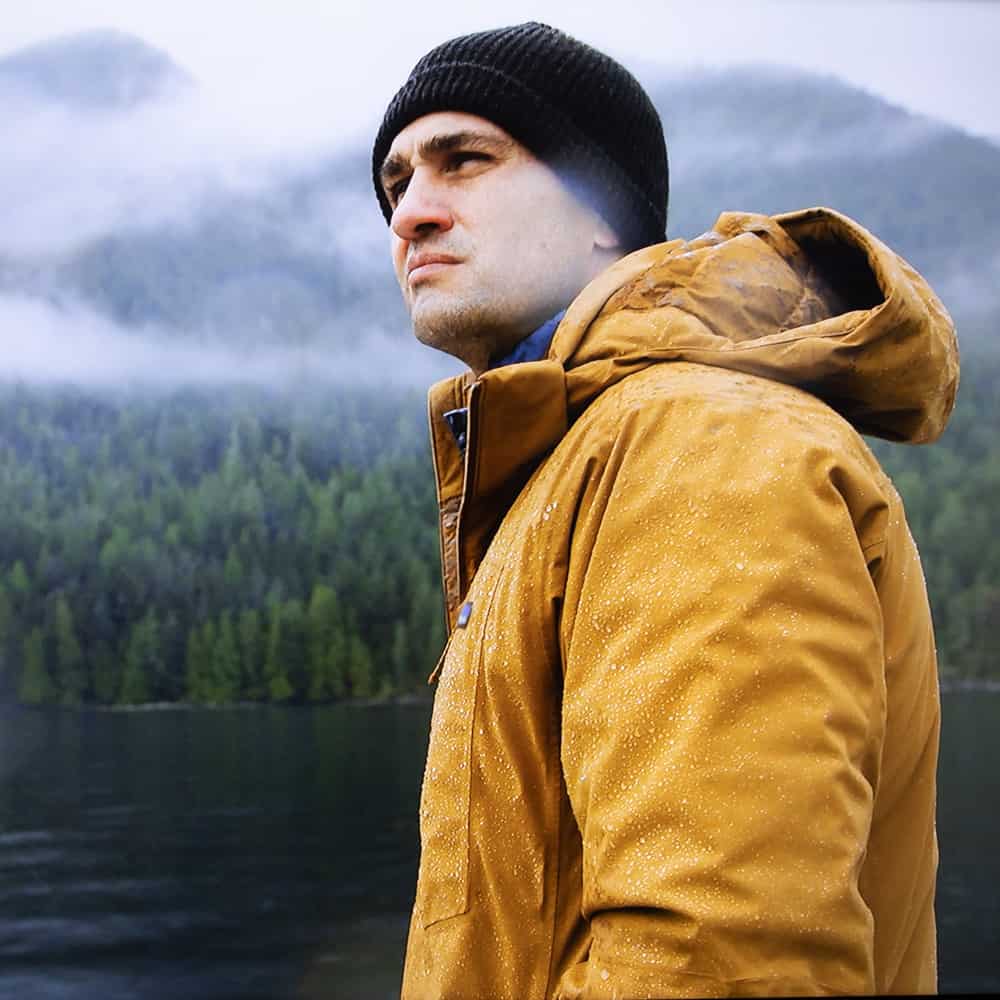
The second judge Valerie said it tasted strongly of crab, but the editors cut that part out. Never mind that people were lining up to taste the sauce off spoons exclaiming how good it was off-camera. One of my takeaways was that reality in reality television can be what an editor wants it to be.
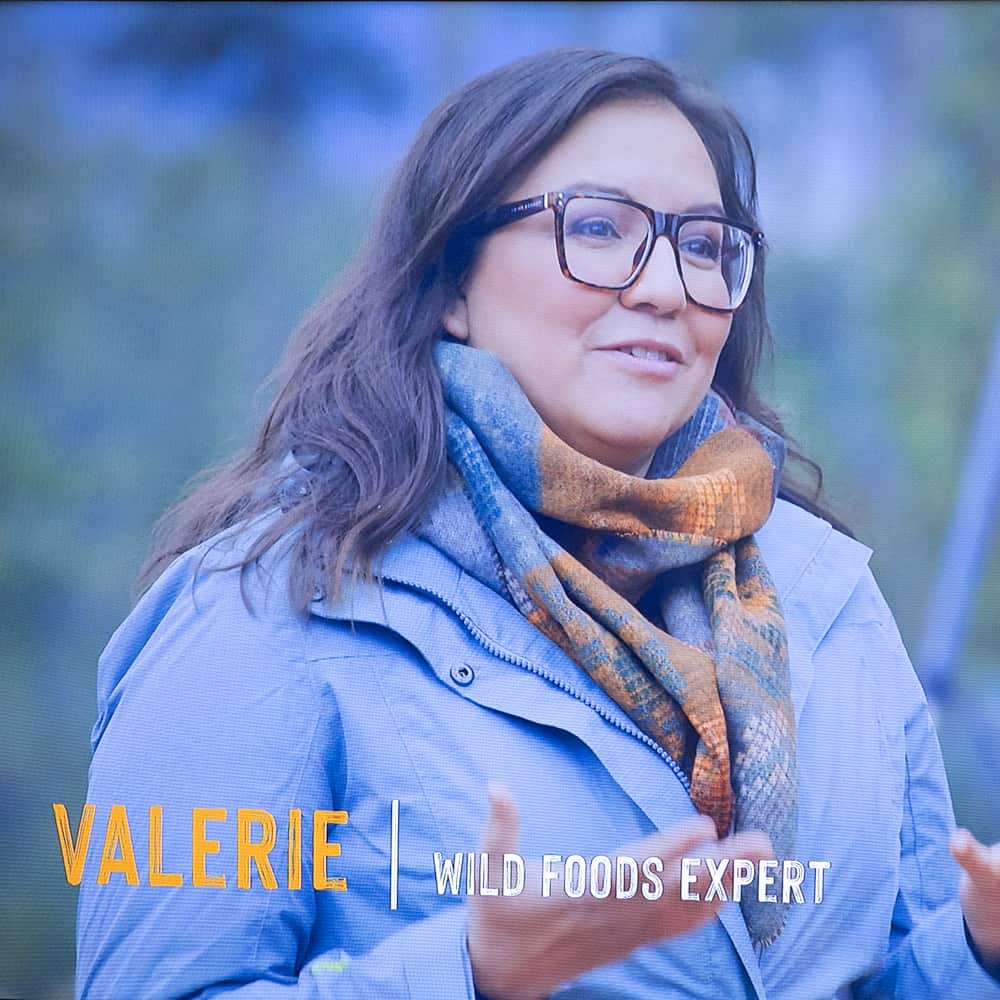
Mushrooms
It was my first time in the Pacific Northwest so I had grand designs of finding matsutake. Unfortunately there were few mushrooms to be found.
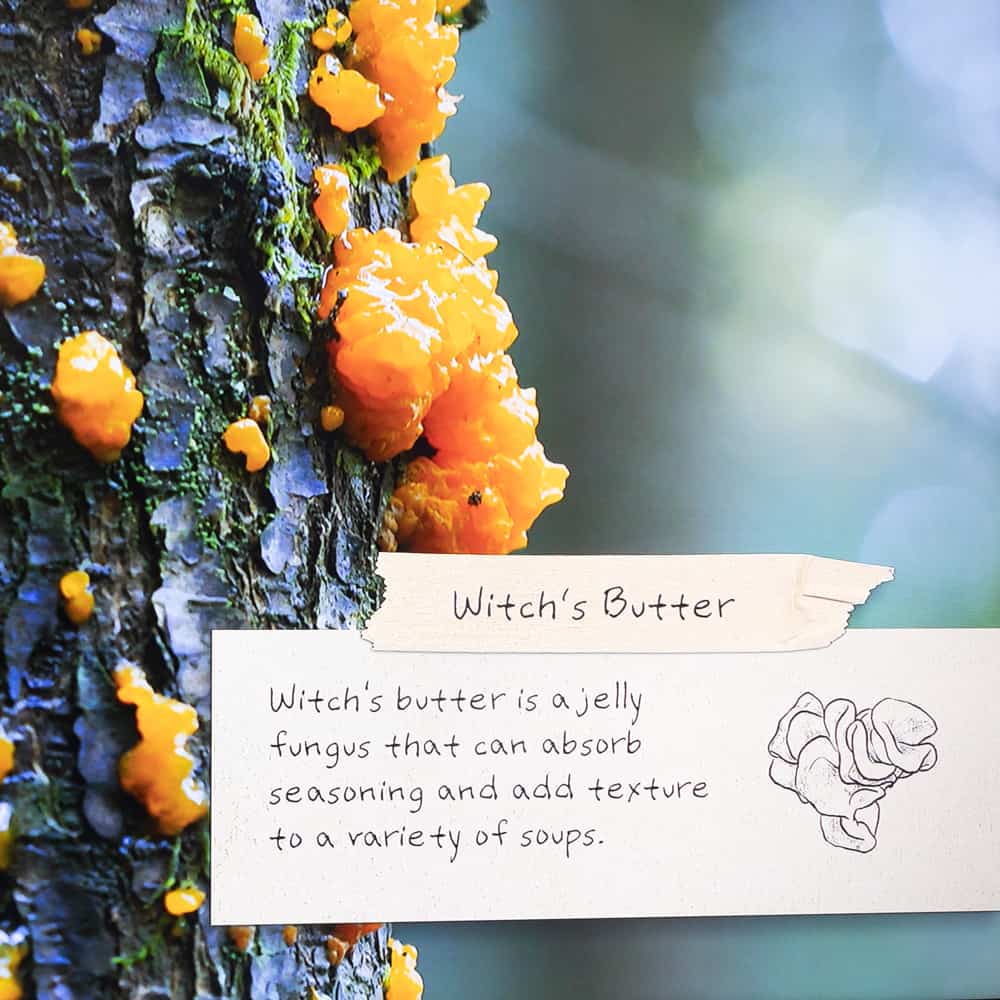
Sure there was some witches butter and something like angel wings, but nothing of real value for me. But, by a stroke of luck, I was able to find a handful of chanterelles on the second-to-last day we were in the wilderness.
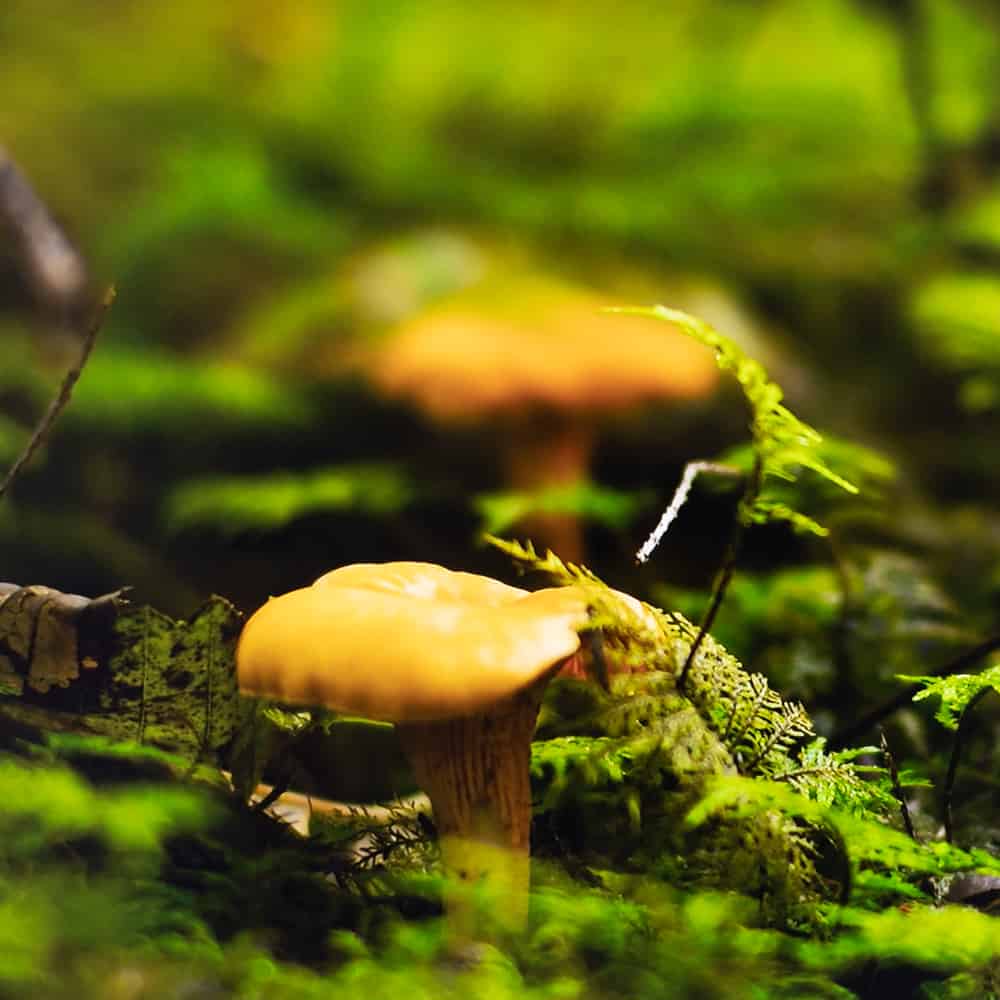
Competition
The last night in the wilderness we were brought to a pre-made "shelter". Nico and Greg were set up with a small a-frame made of logs. Baha and I were shown to a small dug-out on the side of a hill. The entrance was only big enough for one person to crawl through, and the floor was slanted. I tried to get what sleep I could, through the drips of rain, spiders crawling on my face, and lumber-sawing snores of my partner.
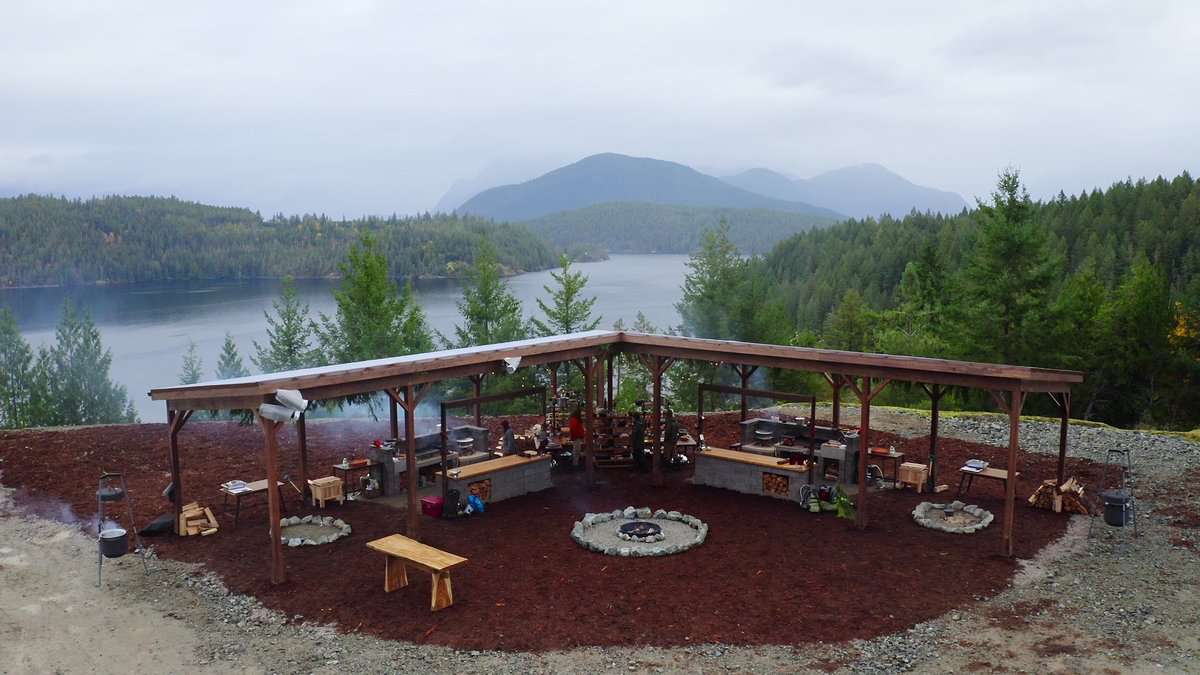
I was relieved when they brought us to the kitchen, which overlooked the fjords and was well-designed. Apparently they hired a culinary consultant near the end who had actual experience, which put to rest my fears of cooking on a Weber grill.
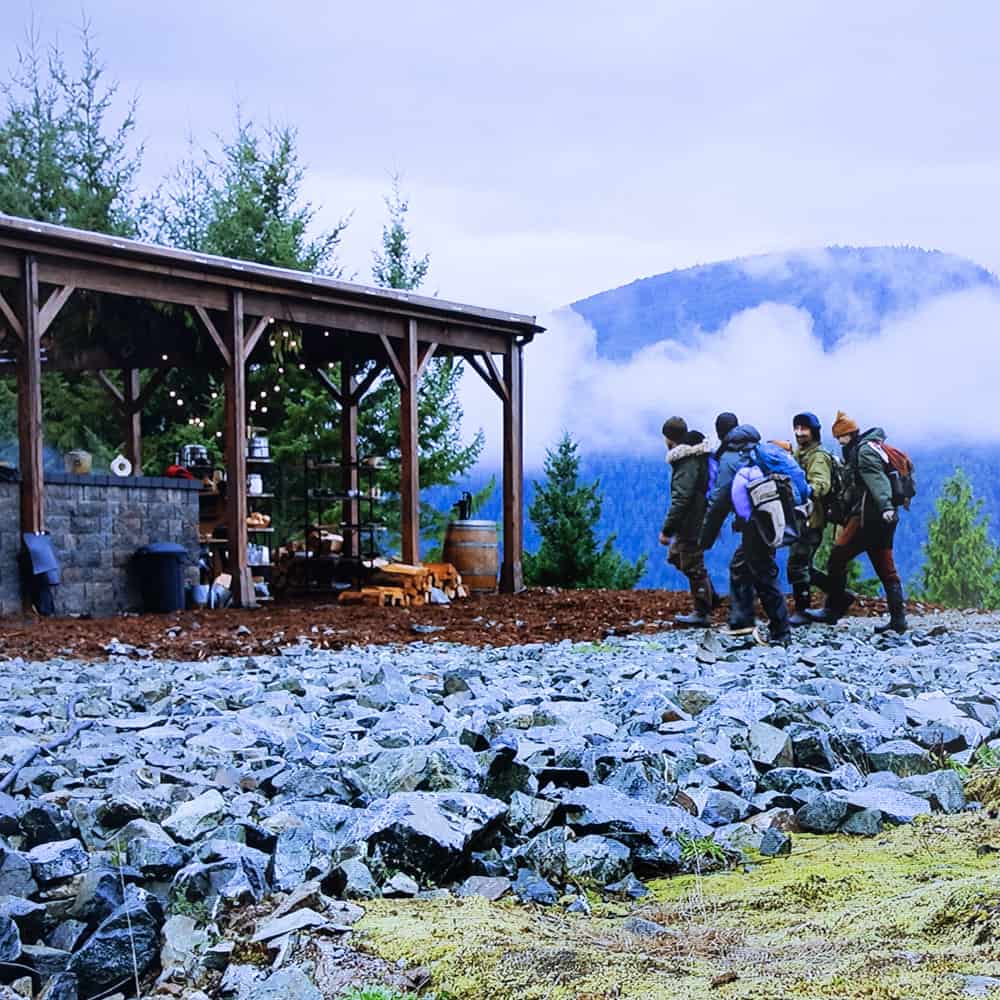
Regardless, by the time the competition started I felt like a dehydrated corpse. My lips chapped and bleeding, my mind and body weak and exhausted before the cooking even began.
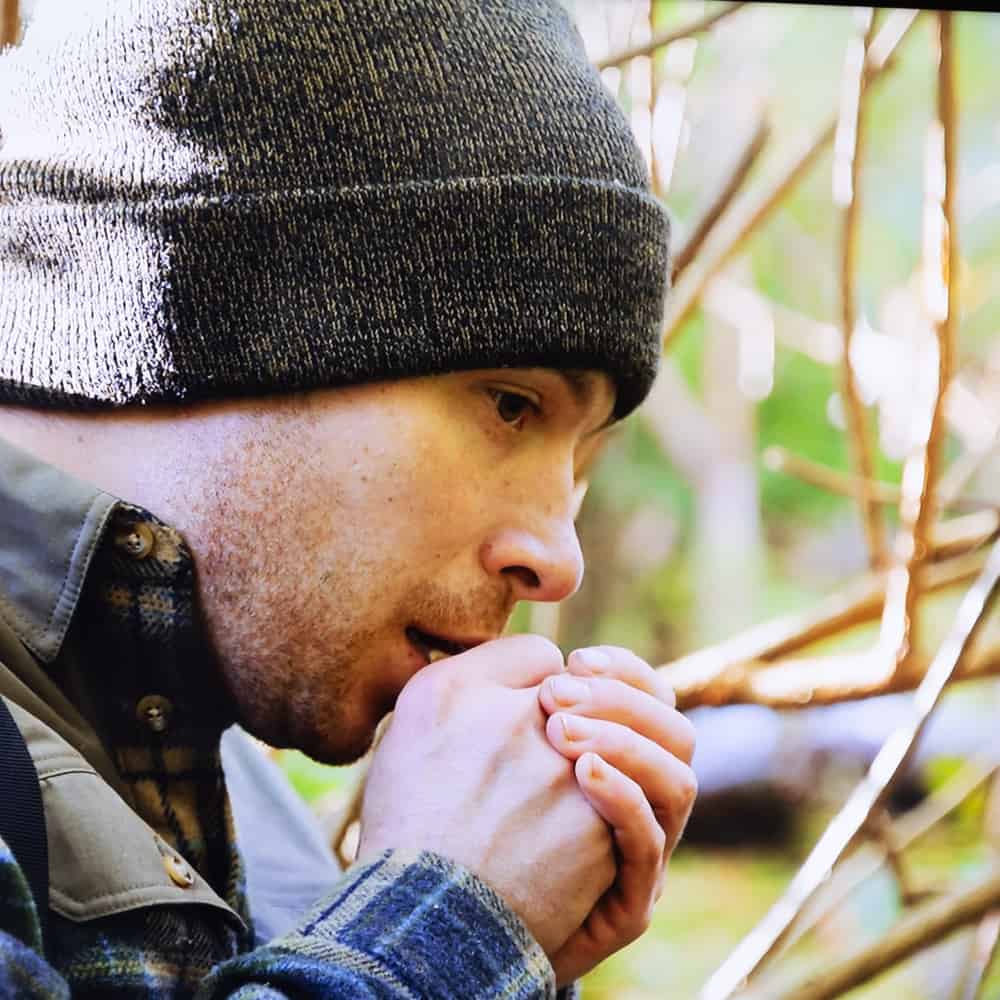
Originally we were supposed to have 5 hours to cook. Later that changed to 4 hours after they gave the first team 3 hours and they couldn't finish. Rules seemed fluid, and production seemed to change things on a dime which drove me nuts.
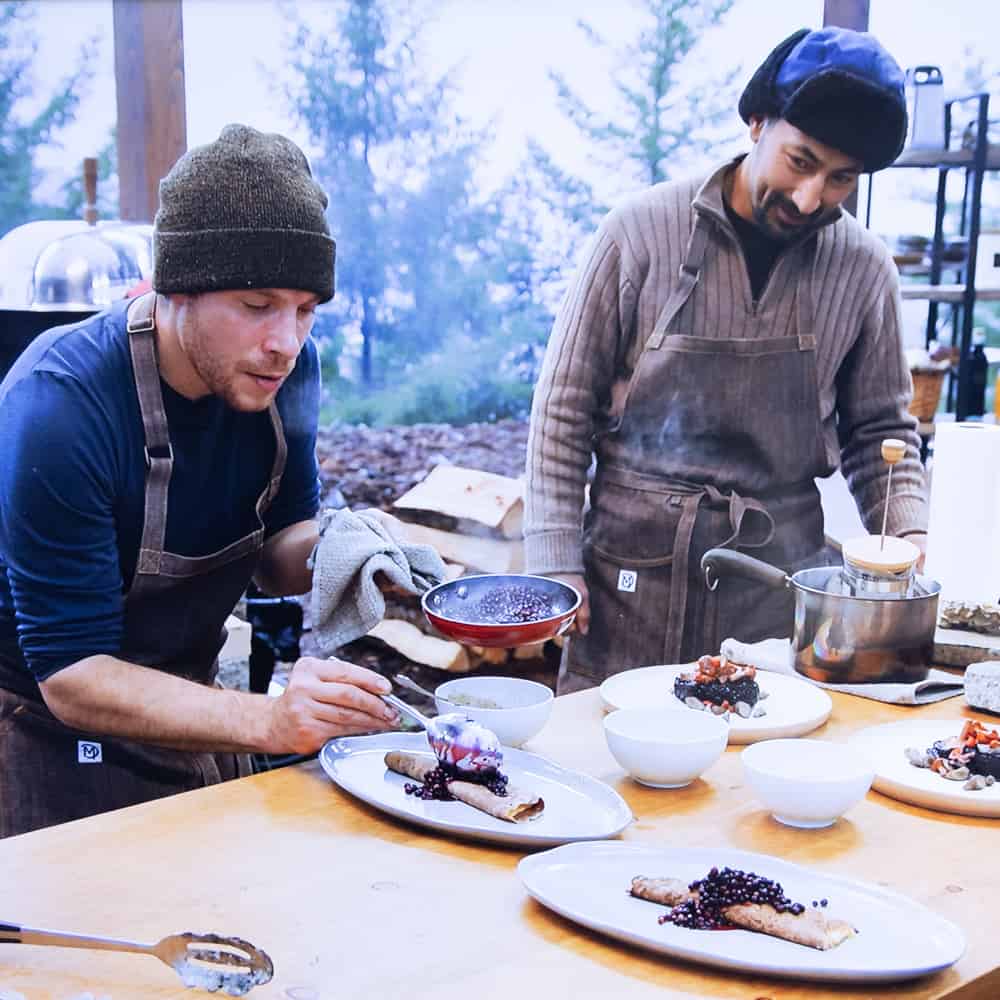
For example, I'd been planning the menu for weeks, and two days before the competition I was informed that the powers that be said I couldn't make pasta because someone else did on the first episode. I didn't like having my food art directed, but in the end it worked out and I was happy with what I made.
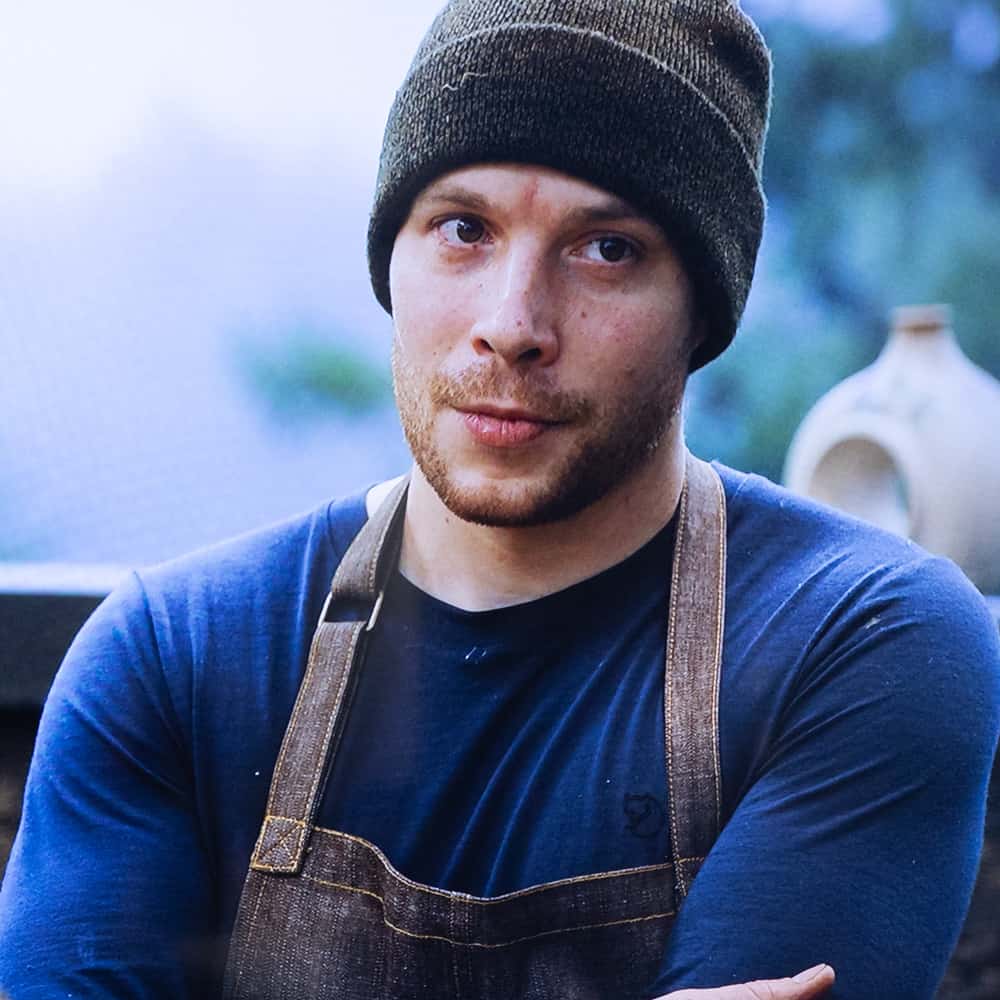
Oh, and when you hear the words competition, another word that goes along with that is "prize". If you win on Alone, you get $500k. I didn't expect anything like that, but no prize at all for what we went through seems anticlimactic. Here's the food I made.
My Dishes
Oysters with Nettles and Wild Crab Hollandaise
Thinking of Oysters Rockefeller I used to serve, I gently cooked some oysters and removed them from their shells, put some cooked nettles in each shell, put the oyster back on top, and finished it with the crab-flavored hollandaise.
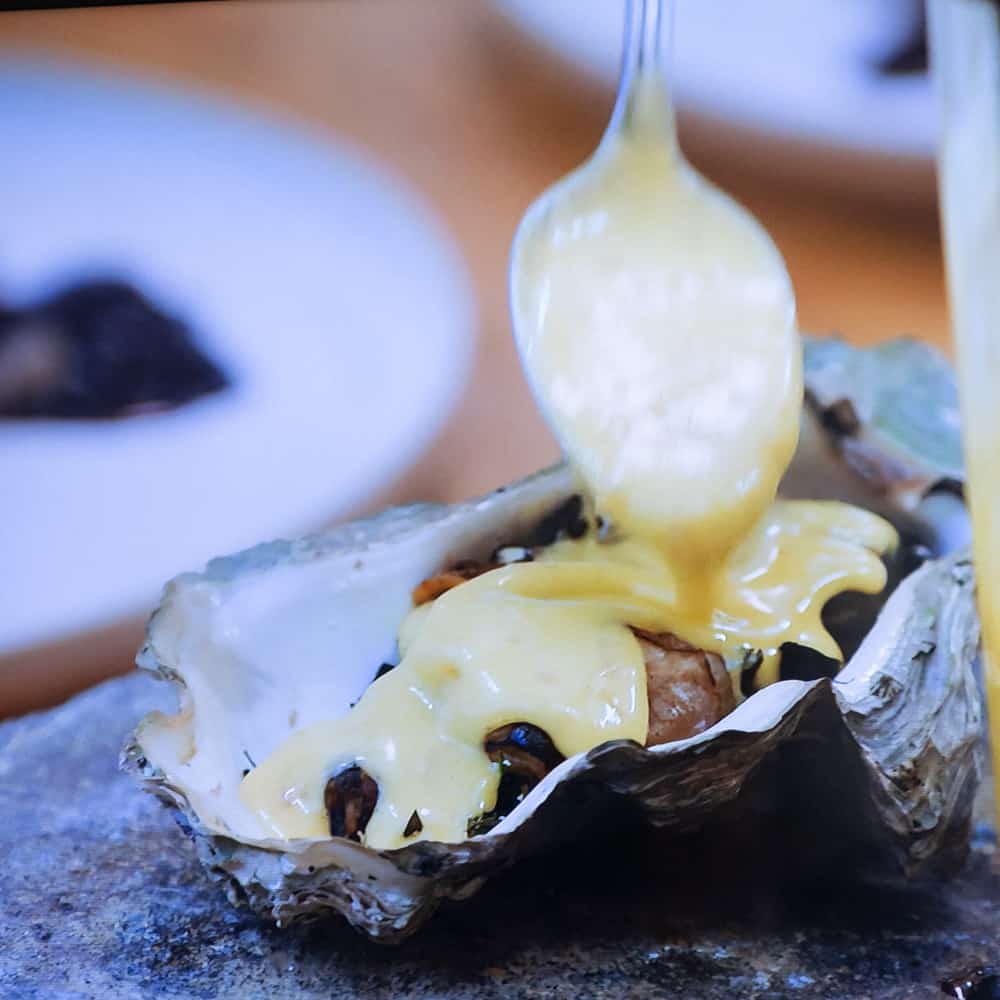
Lacquered Elk Ribs, Chanterelle-Rose-Hip Conserve and Thistle Roots
Elk ribs take a long time to cook. Four hours wasn't really enough time for them to get tender on the bone, so I remove the bones and basically boiled the meat to the next dimension with some oatmeal stout, lacquering them with their own juices to a shiny glaze.
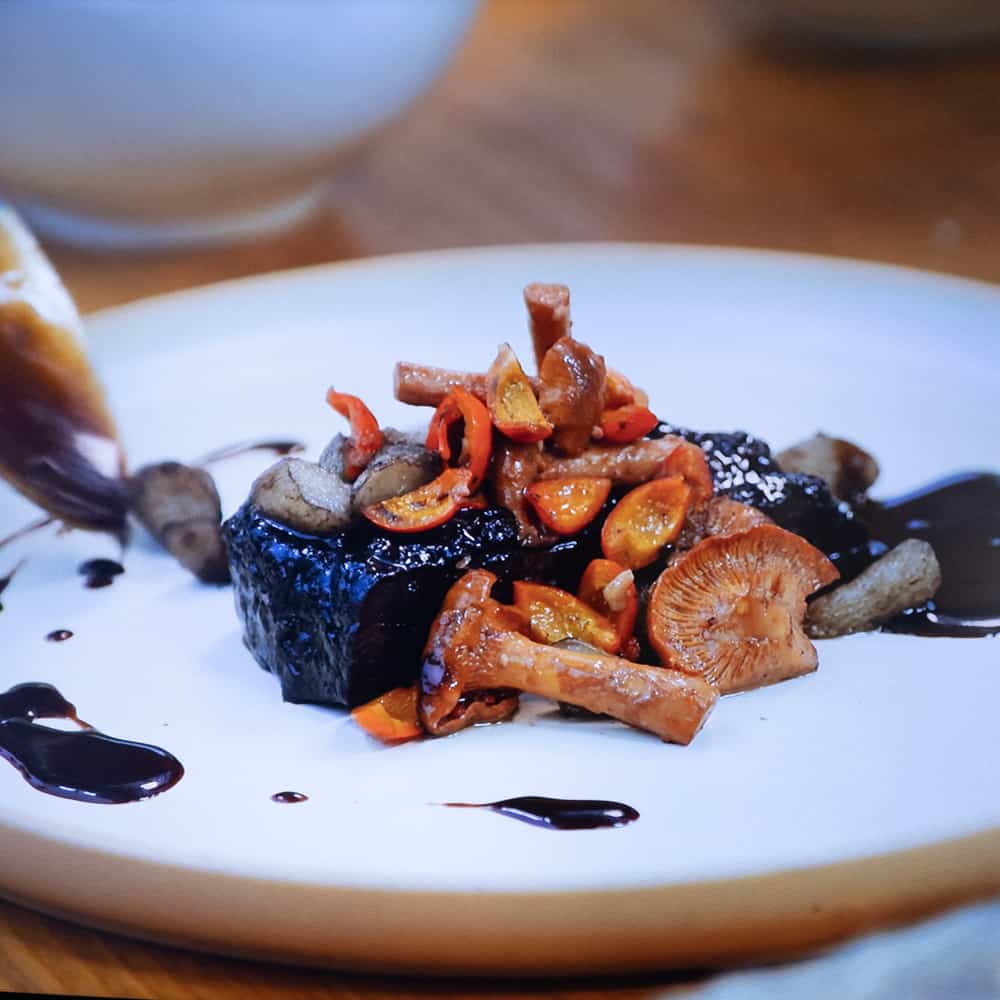
The chanterelles and rosehips are a riff on my recipe for mushroom conserve, warmed up and placed on top. The thistle roots were boiled and gently browned in duck fat.
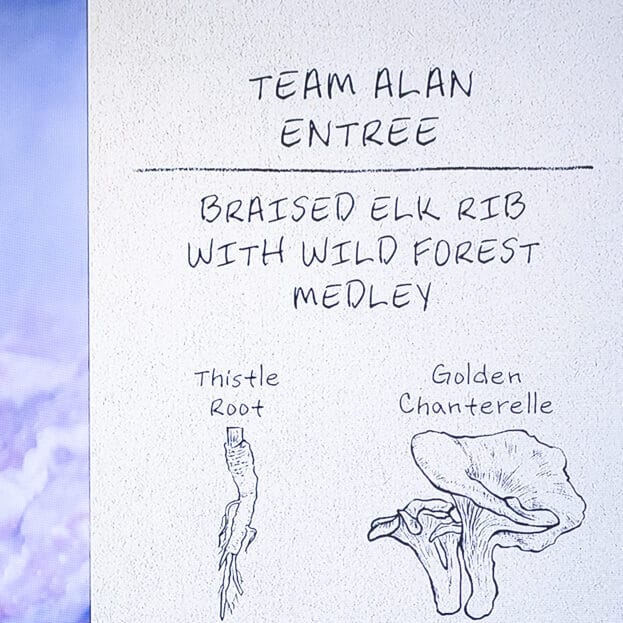
Broth of Grilled Elk Bones with Cedar
A basic clear broth of grilled bones infused with cedar was the third course I made that you don't see in the competition.
Acorn Crepes with Huckleberries and Alder-Smoked Pastry Cream
Since the production company put acorns on the ingredient list, but didn't know how to cook with them, I managed to sell them acorn flour I made.
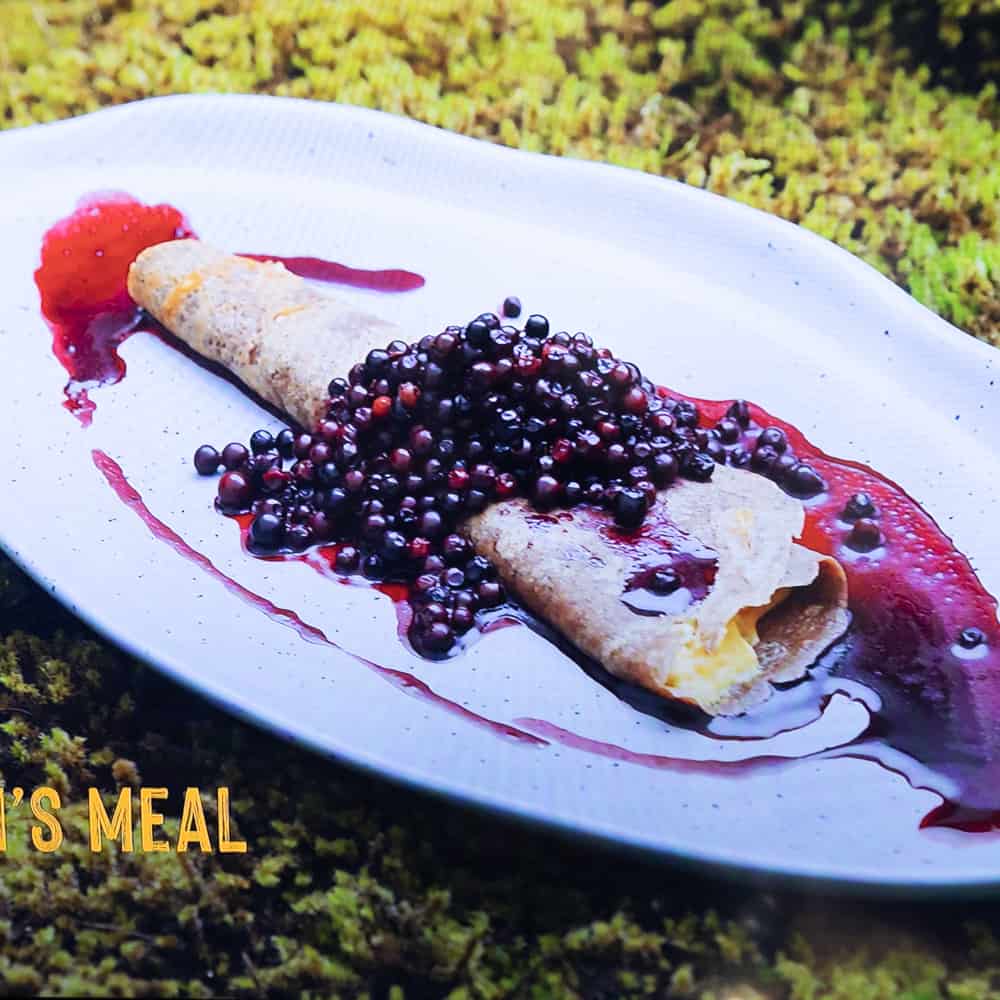
Wood fire ovens can be dicey, so I made crepes. For the pastry cream, I take a piece of burning alder wood and quench it in cream sweetened with caramel. It's a riff on one of my favorite desserts from Saison SF. They don't mention the smoked pastry cream in the episode.
The Aftermath
The psychological stuff people talk about is real. Physically and emotionally, this was one of the hardest things I've done. Every contestant has ongoing appointments before and after the competition with a psychiatrist familiar with this kind of experience and, even only having been out a few days, I can understand why.
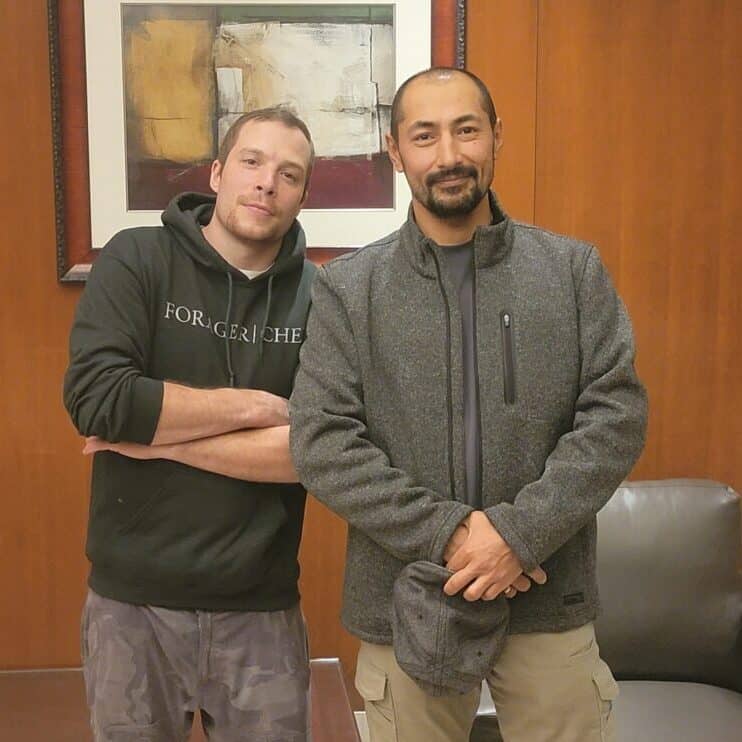
After the competition, I remember bringing a garbage bag full of oysters back to my hotel room as I'd developed a strange craving for them. As I shucked them in the tub, eating them like an animal, I remember being overcome with emotion and crying harder than I've ever cried in my life-the kind of ugly thing where your whole body heaves. I remember telling my family it felt like I was vomiting tears.
I didn't know what was wrong with me, if I was having a mental break or what was going on. In hindsight, I know what I was processing was an immense feeling of relief.
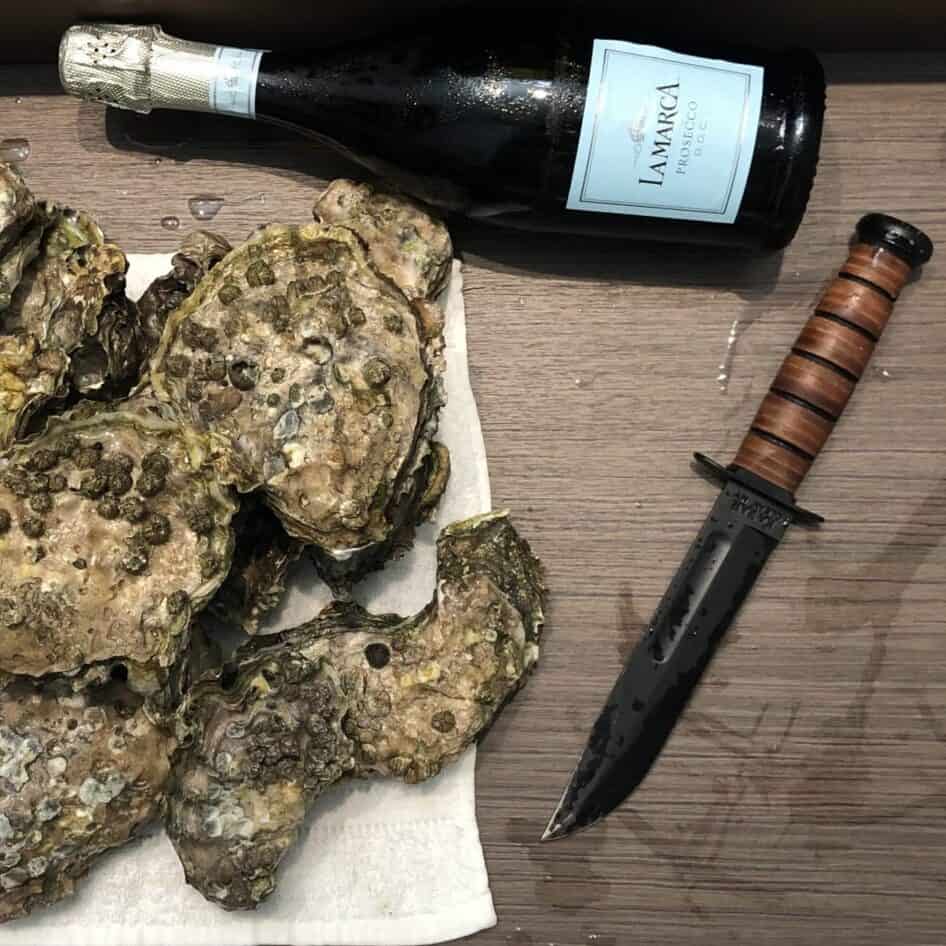
One of the questions I've been getting is "would you do it again?". The short answer is I don't know. This post probably seems like I'm complaining about the experience, but I'm getting better at laughing at parts of it. As for the bigger question of who won the competition, watch and find out. If you haven't seen it, the trailer's below.
Watch The Show
Special Thanks
Production staff
Big thanks to everyone on set, especially all the P.A.'s who worked so hard, our field producer Sarah Kotzman, Mary Brent Galyean. I also have to shout out Ashlyn Morgan, the food stylist who flew up this fall to help me with the Midwest Wild Harvest Festival.
Equipment sponsors
Thanks to Benchmade Knives and Duluth Pack for sponsoring some of my equipment. The budget we were given for a very specific list of equipment was comically small, and I ended up spending at least an extra $1k out of pocket to get equipment fitting the shows specifications.
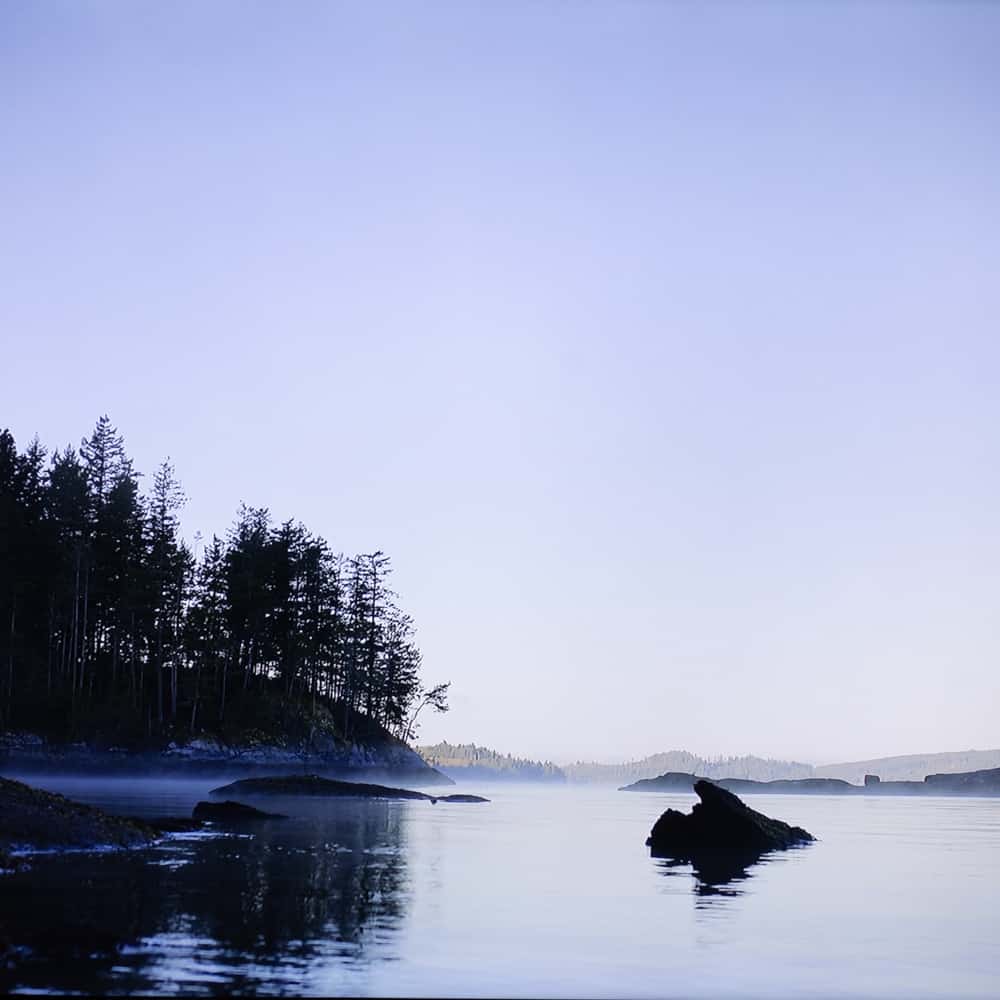

Victor Cruz
I thoroughly enjoyed reading your blog post about the behind-the-scenes of "Chefs vs. Wild." It's fascinating to gain insights into the intricate process and challenges faced by chefs in the wilderness. Your firsthand account offers a unique perspective on the show and sheds light on the dedication and creativity required to cook with limited resources and unfamiliar ingredients.
"Chefs vs. Wild" sounds like an extraordinary culinary adventure that pushes chefs out of their comfort zones and into the wild. The concept of sourcing ingredients directly from nature and adapting to the environment presents an exciting and unpredictable culinary experience. Your description of foraging for wild ingredients and the process of creating gourmet dishes in the wilderness is truly captivating.
I appreciate how you highlighted the importance of local knowledge and expertise when foraging in unfamiliar territories. The collaboration between the chefs and local guides not only ensures a safe and responsible foraging experience but also enhances the authenticity and depth of the culinary creations. It's inspiring to see how the chefs embrace the opportunity to learn from the land and the local community.
Furthermore, your mention of the camaraderie and shared experiences among the chefs adds a human touch to the narrative. It's heartwarming to see how they bond over their love for food and the challenges they face together. The spirit of collaboration and support shines through your storytelling, reminding us of the power of food to bring people together.
Thank you for sharing your behind-the-scenes experience of "Chefs vs. Wild." Your account provides a fascinating glimpse into the world of culinary adventure and the resilience of chefs in the face of unique challenges. I look forward to exploring more of your blog and learning from your expertise in foraging and wild cuisine.
Keep up the great work, and thank you for your dedication to showcasing the beauty and bounty of nature through culinary exploration.
sarahspectacular
Hello! I'm not into reality shows, but as a resident of Washington state I'm very interested in what you did with those shore crabs! Unfortunately, we're not allowed to harvest them here, but now I know what to do if the regulations ever change. I hope you get the opportunity to come back to the PNW on your own terms. We have a lot of wonderful foraging opportunities here that are very different from where you are in Minnesota. Thank you for sharing.
Dean Sherwood
Thank you for going through this and writing so elegantly about it. I accept your account and now I don't have to go through this myself..
Alyssa
Alan,
I was talking to my husband about your work on a Friday after we discovered some non aborted entolomas and you were one of the few places I trusted to help me navigate the edibility process of those mushrooms.
The next day I found this show and was so delighted to see you on it. I loved the crab hollandaise idea and can't wait to cook my first thistle root.
Thanks for all that you do, but most importantly, thanks for sharing your emotional processing of the relief grief experience. What a delight to have an internet mentor that is real in whatever ways possible.
Blessings on your journey and fuck TV for no cash prize 🙂
Alyssa @ Mother of Blades
Alan Bergo
LOL. Thanks Alyssa. I tried to be as honest about the experience as possible. It was a lot tougher than it appears on screen.
juniper
It was so difficult reading about how little the producers appeared to respect the participants. To expect talent to work without reward as well as disregard even the names of your creations?? Very abusive and just wrong. Your materials budget should have been reimbursed. I hope you were paid for doing the series?
You and your work are VALUABLE. Food tv as well as survival tv are two of the most popular trends right now. Combining them into one show? BRILLIANT. You all should have been treated like the VALUABLE TALENT you are. I do hope you will take other creative opportunities - I for one will be watching. But only with appreciative compensation.
Alan Bergo
Thanks Juniper. Yeah it wasn't easy. Part of me wanted to do it because I knew that if I didn't, the talent pool they could be working with probably didn't have much actual wild food experience, which is extremely apparent if you watch some of the later episodes after mine. One survivalist gives his chef raw skunk cabbage, and then the guy complains of his "throat burning"-go figure. They also have another chef who cooks "fiddleheads" of an unknown species they harvested in late fall that I would never serve to anyone. Shows like this will continue to be filmed whether actual people in the wild food community participate or not, so I really wanted to try and do good by the wild food community that has taught me so much. Thanks for commenting.
Killian O Donnell
Fascinating. Your experience with skunk cabbage brought to mind the composer John Cage, who nearly died in 1954 when he mistook poisonous hellebore for the stuff. Apparently hellebore has pleated leaves, skunl cabbage does not. Never munch on a hunch
Killian
Alan Bergo
Yeah skunk cabbage is widely known as not being edible. Kinda of a joke. These sorts of examples, along with the "fiddleheads" cooked in another, later episode, are what I feared would happen in wild food show being made without wild food experts on the production side.
Carla Beaudet
Hi Alan, I'm afraid if the intent was to sell television, they found my hook. Congratulations on winning the contest. I hope the cash will give you enough of a resting cushion that you can consider whether or not you will return for the playoffs, which will doubtlessly emerge in season 4 or 5. I have not been a regular TV watcher since the 80's when I left my parents' home for college. But I confess to having binge-watched most of ALONE during 2020 when I was pretty much at home all the time (in Green Bank, WV, A.K.A. as far from everything as one can get East of the Mississippi). I wish you were profiting from my HULU subscription instead of HULU.
Alan Bergo
Thanks Carla. Unfortunately there was no cash prize.
SK
That really pisses me off. You all deserved something for all this. Incredible.
Alan Bergo
Yeah it was a time alright.
Laura
People suck. You are amazing!!!
Ben Rosen
Nice Read , the dishes sound awesome. It’s one think when working with nature that won’t behave as you like . It’s another whole level when your a the whim of others .